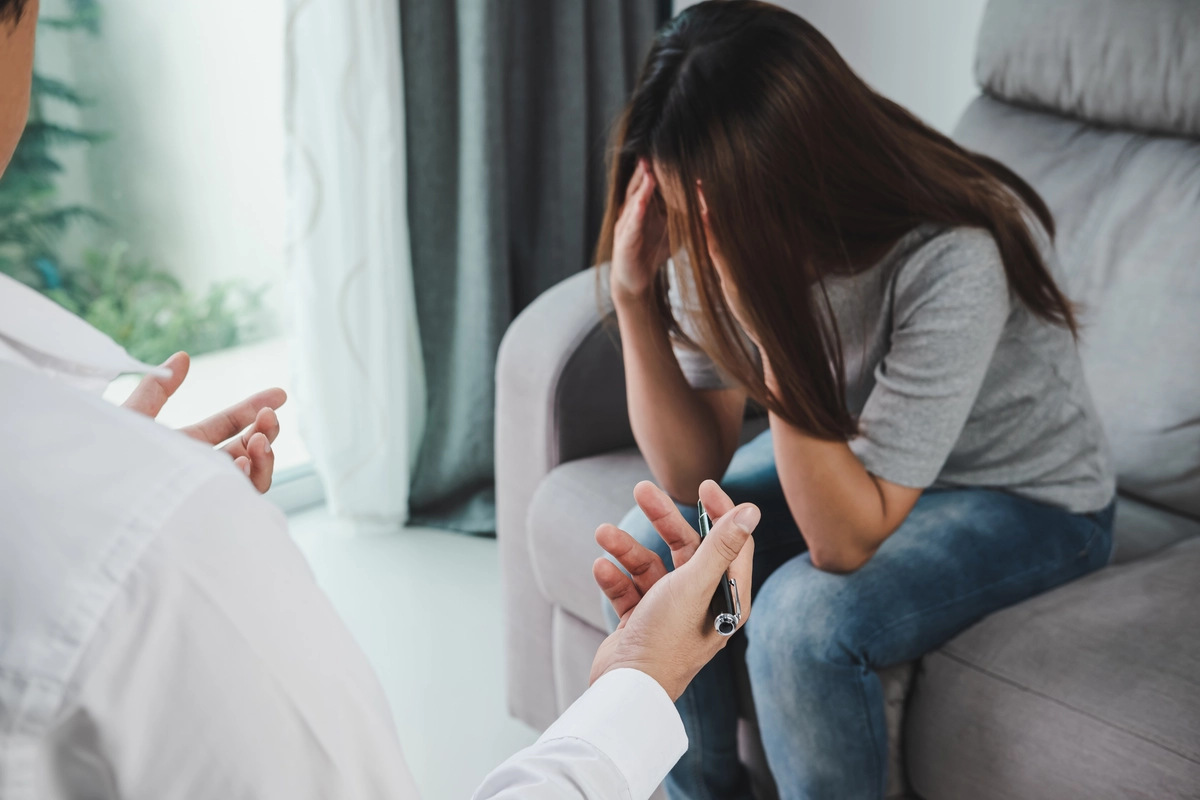24/7 Helpline:
(866) 899-111424/7 Helpline:
(866) 899-1114
Learn more about Bipolar Disorder Treatment centers in California
Bipolar Disorder Treatment in Other Cities

Other Insurance Options

Carleon

Regence

Cigna

Premera

Amerigroup

Holman Group

Excellus

Ambetter

CareFirst

MHNNet Behavioral Health

American Behavioral
Beacon

Group Health Incorporated

Molina Healthcare

Lucent

Health Net

State Farm

Providence

WellPoint

BlueCross

New Life House – Los Angeles Sober Living
New Life House – Los Angeles Sober Living is a private rehab located in Los Angeles, California. New...

BAART Programs
BAART Programs, in Lynwood, California, provide outpatient addiction treatment for adults in opioid ...

Visions Of The Cross (VOTC)
Visions Of The Cross (VOTC) is a private rehab located in Redding, California. Visions Of The Cross ...

Hollywood Hills Recovery
Hollywood Hills Recovery is a private rehab located in Los Angeles, California. Hollywood Hills Reco...

Diamond House Detox Sacramento
Located in Sacramento, California Diamond House Detox Sacramento provides premier detoxification ser...

My Time Recovery
My Time Recovery is a private rehab located in Fresno, California. My Time Recovery specializes in t...

Sacramento Recovery House
Sacramento Recovery House is a residential treatment program for men seeking from alcohol and drug a...

California Prime Recovery
California Prime Recovery is a drug and alcohol rehab for adults with substance use disorders, situa...

Serenity Lodge
Serenity Lodge, in Lake Arrowhead, California, is a luxury, 12 step-focused drug and alcohol rehab f...

New Life Community Services
New Life Community Services is a drug and alcohol treatment center in Santa Cruz, California that su...

Visions Unlimited – Sacramento
Visions Unlimited – Sacramento is a private rehab located in Sacramento, California. Visions Unlimit...

California Recovery Center
Located in Roseville, California, California Recovery Center Provides alcohol and drug rehab service...

Enki Youth and Family Services
Enki Youth and Family Services is a private rehab located in La Puente, California. Enki Youth and F...

Akua Detox San Diego
Akua Detox San Diego is a private rehab located in San Diego, California. Akua Detox San Diego speci...

Oceanfront Recovery
Oceanfront Recovery is a premier rehabilitation center for men and women struggling with substance a...

Monarch Shores
In beautiful Capistrano Beach, California, Monarch Shores is an alcohol and drug rehab center that p...

Casa Palmera
Casa Palmera, in Del Mar, California, is a luxury, 12 ste-ofucsed drug and alcohol rehab for adults ...

Crestwood Behavioral Health Center
Crestwood Behavioral Health Center, in Eureka, California, provides integrative mental health care a...

Passages
Passages Malibu is a luxury, 12 step-alternative drug and alcohol rehab for adults in Malibu, Califo...

AToN Center
AToN Center is a residential substance misuse and detox facility. We emphasize individualized treatm...

The Holistic Sanctuary
Most Exclusive Healing Center In The World. The Holistic Sanctuary is a Luxury Healing Center based ...

Miramar Recovery Center – Newport Beach Rehab
Miramar Recovery Center – Newport Beach Rehab is a private rehab located in Newport Beach, Californi...

Tarzana Treatment Centers – 44447 10th Street West
Tarzana Treatment Center – 10th Street West is a comprehensive drug and alcohol rehab for adults in ...

Apex Recovery
Apex Recovery is a private rehab located in San Diego, California. Apex Recovery specializes in the ...

Seasons In Malibu
Seasons In Malibu is a World Class, Luxury, dual-licensed treatment center in beautiful Malibu, CA. ...

Woodglen Recovery Junction
Woodglen Recovery Junction is a detox clinic located in Fullerton, CA. Woodglen Recovery Junction sp...

Berkeley Addiction Treatment Services
Berkeley Addiction Treatment Services is a private rehab located in Berkeley, California. Berkeley A...

MHS – San Bernardino Center for Change – PRIDE
MHS - San Bernardino Center for Change/PRIDE provides outpatient treatment for individuals who have ...

Lighthouse Treatment Center
Lighthouse Treatment Center is a drug and alcohol rehab that supports adults struggling with addicti...

Walter Hoving Home
Walter Hoving Home is a non-profit rehab located in Pasadena, CA. The Hoving Home is a residential s...

Kaiser Permanente – Addictions
Kaiser Permanente – Addictions is a private rehab located in Los Angeles, California. Kaiser Permane...

New Dawn Treatment Centers – Men’s Detox
New Dawn Treatment Centers - Men's Detox offer a residential treatment detox for those who need help...

Humboldt Recovery Center – Men’s Counseling
Humboldt Recovery Center - Mens Counseling is a private rehab located in Eureka, CA. Humboldt Recove...

Elevate Addiction Services
Located in Watsonville, California, Elevate Addiction Services provides alcohol and drug rehab servi...

New Bridge Foundation
New Bridge Foundations is an award winning drug and alcohol addiction treatment center for adults in...

Essential Behavioral Health
Located in Sacramento, California, Essential Behavioral Health provides alcohol and drug rehab servi...

Monte Nido
Monte Nido is an eating disorder center at Newport Beach that serves as a stand-alone facility for m...

Solutions For Positive Choices
Solutions For Positive Choices is a private rehab located in Paradise, California. Solutions For Pos...

HOPICS – South Broadway
HOPICS — which stands for Homeless Outreach Program Integrated Care System — is a community organiza...

Tarzana Treatment Center – West Lancaster Boulevard
Tarzana Treatment Center - West Lancaster Boulevard is a full-service behavioral healthcare organiza...

Teamsters Alcohol Rehab Program
Teamsters Alcohol Rehab Program is a private rehab located in Modesto, CA. Teamsters Alcohol Rehab P...

Soledad House
Soledad House offers inpatient treatment for women with alcohol and/or substance addiction. The prog...

Eternal Purpose Recovery Center
Eternal Purpose Recovery Center is a luxury alcohol and drug rehab located in North Hollywood, Calif...

Tarzana Treatment Centers – Magnolia Avenue
Tarzana Treatment Centers - Magnolia Avenue is a full-service behavioral healthcare organization tha...

Malibu Detox
Malibu Detox is a luxury co-occurring mental health and substance use disorder rehab in Topanga, CA....

El Cajon Treatment Clinic
Located at Located at 234 N. Magnolia Avenue in El Cajon, California, the El Cajon Treatment Center/...

Action Consultants Therapy
Action Consultants Therapy is a private rehab located in Costa Mesa, California. Action Consultants ...

El Dorado County Health and Human Services Alcohol and Drug Programs
El Dorado County Health and Human Services Alcohol and Drug Programs offered outpatient programs foc...

BAART Programs
BAART Programs Sacramento is an outpatient drug rehab for adults in opioid recovery in Sacramento, C...

Tarzana Treatment Center
Tarzana Treatment Center - West Avenue is a full-service behavioral healthcare organization that pro...

Balance Treatment Center
Balance Treatment Center - Las Virgenes Road offers intensive outpatient and inpatient services for ...

Luxe Recovery
Located in Los Angeles, California, Luxe Recovery is a drug and alcohol rehab that supports adults s...

Tarzana Treatment Center
Tarzana Treatment Center - Reseda Boulevard is a full-service behavioral healthcare organization tha...

Sober College
Sober College provides substance abuse and mental health treatment for young adult men and women age...

Consolidated Tribal Health Project
Consolidated Tribal Health Project provides behavioral health services for children, youth, adults, ...

Windward Way Recovery
Windward Way Recovery is a private drug and alcohol rehabilitation facility in Newport Beach, Califo...

AEGIS – Marysville
AEGIS – Marysville is a private rehab located in Marysville, California. AEGIS – Marysville speciali...

Monte Nido – Eating Disorder Center of California
Monte Nido – Eating Disorder Center of California is a private rehab located in Los Angeles, Califor...

Serenity Malibu
Serenity Malibu is a dual-diagnosis luxury addiction treatment center that provides one-on-one treat...

Tarzana Treatment Centers – 18646 Oxnard Steet
Tarzana Treatment Centers – Oxnard Street is a comprehensive drug and alcohol rehab for adolescents ...

The Lighthouse – Sober Living
The Lighthouse – Sober Living is a private rehab located in Lomita, California. The Lighthouse – Sob...

San Fernando Valley Community Mental Health Center – Elderly
San Fernando Valley Community Mental Health Center – Elderly is a private rehab located in Van Nuys,...

Alcohol and Drug Abuse – Latino Recovery Home
Alcohol and Drug Abuse - Latino Recovery Home offers inpatient treatment for individuals with alcoho...

South Bay Pioneers
South Bay Pioneers is a non-profit rehab located in Chula Vista, California. South Bay Pioneers spec...

Growth Extended
Growth Extended offers intensive outpatient and residential treatment for adolescents who struggle w...

Pasadena Public Health Department – Social & Mental Health Division
Pasadena Public Health Department - Social & Mental Health Division is a public rehab located in Pas...

New Vistas Sober Living
New Vistas Sober Living is a private rehab located in Los Angeles, California. New Vistas Sober Livi...

Corona Regional Medical Center – Behavioral Health
Corona Regional Medical Center – Behavioral Health is a private rehab located in Corona, California....

Yucca Valley Center for Change
Yucca Valley Center for Change offers an outpatient program dedicated to support and improvie lives ...

Options Recovery Services
Options Recovery Services is a private rehab located in Berkeley, California. Options Recovery Servi...

Chances Sober Living Homes – Mulberry Men’s Home
Chances Sober Living Homes - Mulberry Men's Home offers inpatient treatment for individuals recoveri...

Clearview Treatment Programs – Grandview Avenue
Clearview Treatment Programs – Grandview Avenue is a private rehab located in Los Angeles, Californi...

Teen Solutions
Teen Solutions is a private rehab located in Mill Valley, California. Teen Solutions specializes in ...

Bimini Recovery Center – Mary Lind Recovery Centers
Bimini Recovery Center – Mary Lind Recovery Centers is a private rehab located in Los Angeles, Calif...

Life Practice Counseling
Life Practice Counseling is a non-profit rehab located in Oakland, California. Life Practice Counsel...

Felton Institute – Geriatric Outpatient Mental Health Services
Felton Insitute - Geriatric Outpatient Mental Health Services is a non-profit rehab located in San F...

Fred Brown Recovery Services – 276 West 14th Street
Fred Brown Recovery Services – 276 West 14th Street is a private rehab located in Los Angeles, Calif...

Friendship House
Friendship House is a residential treatment American Indian women struggling with substance abuse is...

Our Common Ground
Our Common Ground is a private rehab located in East Palo Alto, California. Our Common Ground specia...

Hanbleceya Treatment Center
Hanbleceya Treatment Center, now BrightQuest, is a co-occurring drug and alcohol addiction rehab cen...

Turning Point of Central CA – Outpatient
Turning Point of Central CA – Outpatient is a private rehab located in Bakersfield, California. Turn...

Psychiatric Care Center
Psychiatric Care Center is a private rehab located in Redding, California. Psychiatric Care Center s...

BHS – Patterns
BHS - Patterns is a behavioral health treatment provider serving adolescents, adults, and elderly pa...

Henry Mayo Newhall Memorial Hospital – Behavioral Health
Henry Mayo Newhall Memorial Hospital – Behavioral Health is a private rehab located in Santa Clarita...

Center Point – Drugs Abuse Alternatives DAAC
Center Point – Drugs Abuse Alternatives DAAC is a non-profit rehab located in Santa Rosa, California...

Casa Treatment Center
Founded in 1967, Casa Treatment Center is the first recovery home in Pasadena to specifically cater ...

Pine Tree Gardens
Pine Tree Gardens is a non-profit rehab located in Davis, CA. Pine Tree Gardens specializes in the t...

Authentic Recovery Center – Residential
Authentic Recovery Center - ARC provides inpatient and outpatient services for individuals with alco...

Sojourne Discovery Center
Sojourne Discovery Center is a private rehab located in Richmond, California. Sojourne Discovery Cen...

Positive Progression
Positive Progression is a private rehab located in San Jose, California. Positive Progression specia...

Ranch Recovery Centers – Hacienda Valdez
The Ranch Recovery Centers is a drug and alcohol addiction rehab nestled in Desert Hot Springs, Cali...

Narcotics Prevention Project – Methadone Treatment
Narcotics Prevention Project – Methadone Treatment is a private rehab located in Los Angeles, Califo...

Choices in Recovery
Located in Vista, California, Choices in Recovery is a drug and alcohol rehab for adults with substa...

Community Health for Asian Americans
Community Health for Asian Americans is a private rehab located in Richmond, California. Community H...

Sonoma County Behavioral Health – Community Mental Health
Sonoma County Behavioral Health – Community Mental Health is a public rehab located in Guerneville, ...

Airport Marina Counseling Services
Airport Marina Counseling Services is a private rehab located in Los Angeles, California. Airport Ma...

Coastal Care Substance Abuse Institute
Coastal Care Substance Abuse Institute offers outpatient detox services for individuals with a Subst...

Native Directions – Three Rivers Indian Lodge
Native Directions — Three Rivers Indian Lodge is a drug and alcohol rehab located in Manteca, Califo...

Ventura County Behavioral Health
Ventura County Behavioral Health provides a wide range of services for alcohol and drug abuse proble...

LWCC – Lee Woodward Counseling Center for Women
LWCC – Lee Woodward Counseling Center for Women is a non-profit rehab located in San Francisco, Cali...

Ohlhoff Recovery House
Ohlhoff Recovery House is an addiction treatment center for adults, located in San Francisco, Califo...

Santa Barbara Cottage Hospital – Detox Program
Santa Barbara Cottage Hospital is a dual diagnosis facility based in Santa Barbara, California. The ...

Homeless Healthcare of Los Angeles
Homeless Healthcare of Los Angeles is a private rehab located in Los Angeles, California. Homeless H...

Tahoe Youth and Family Services
Tahoe Youth and Family Services is a private rehab located in South Lake Tahoe, California. Tahoe Yo...

Youth and Family Services – Boyle Heights
Youth and Family Services – Boyle Heights is a private rehab located in Los Angeles, California. You...

Riverside County Department of Mental Health – Children’s Interagency Program
Riverside County Department of Mental Health – Children’s Interagency Program is a public rehab loca...

Psychiatric Centers At San Diego
Psychiatric Centers At San Diego offers outpatient services for individuals that have a Mental Healt...

Gods House Ministries – Calvary Ranch
Situated in Lakeside, California, God's House Ministries – Calvary Ranch is a drug and alcohol rehab...

Asian American Recovery Services
Asian American Recovery Services is an outpatient rehab located in Daly City, CA. Asian American Rec...

Ujima Family Recovery Services – Women’s Recovery Center
Ujima Family Recovery Services – Women’s Recovery Center is a non-profit rehab located in San Pablo,...

Turning Point – Community Integrated Services
Turning Point – Community Integrated Services is a private rehab located in Sacramento, California. ...

Family Services – Alcohol and Drug Counseling
Family Services – Alcohol and Drug Counseling is a private rehab located in San Bernardino, Californ...

First to Serve Outreach Ministries
First to Serve Outreach Ministries is a private rehab located in Los Angeles, California. First to S...

BAART Programs San Mateo
BAART Programs is an outpatient clinic who provides methadone treatment and substance use counseling...

Valley Recovery Center
Valley Recovery Center offers those men facing addiction a safe and encouraging environment along wi...

Pacific Clinics – Sierra Family Center
Pacific Clinics - Sierra Family Center is a private rehab located in Glendora, CA. Pacific Clinics -...

Nirvana Drug and Alcohol Institute – Outpatient
Nirvana Drug and Alcohol Institute – Outpatient is a non-profit rehab located in Modesto, California...

A. Lujan Recovery Programs
A. Lujan Recovery Programs is a private rehab located in Fresno, California. A. Lujan Recovery Progr...

Prototypes – Women’s Center
Prototypes - Women's Center offers inpatient and outpatient treatments for women with alcohol and/or...

REACH Project
The REACH Project was founded in 1983 under contract with the City of Antioch, California. This drug...

Valley Health Associates
Valley Health Associates is a rehab located in Salinas, CA. Valley Health Associates specializes in ...

New Directions for Women
New Directions for Women (NDFW) is a drug and alcohol treatment provider offering addiction detox an...

Inland Behavioral and Health Services
Inland Behavioral and Health Services offers intensive outpatient and outpatient services for indivi...

San Luis Obispo County – Drug and Alcohol Services
San Luis Obispo County – Drug and Alcohol Services is a public rehab located in Grover Beach, Califo...

Full Circle Recovery
Full Circle Recovery is a private rehab located in Norco, California. Full Circle Recovery specializ...

Vista Del Mar Behavioral Healthcare Hospital
Vista Del Mar Behavioral Healthcare Hospital is a private rehab located in Ventura, CA. Vista Del Ma...

Horizon Services – Palm Avenue Detox
Horizon Services - Palm Avenue Detox provides social detoxification for individuals struggling with ...

The High Road Program
The High Road Program provides education and substance abuse counseling for individuals referred thr...

OHS – Occupational Health Services – DUI Program
Occupational Health Services (OHS) - DUI Program offers anger management, a state licensed DUI progr...

New Morning Youth and Family Services
New Morning Youth and Family Services is a private rehab located in Placerville, California. New Mor...

Summit Estate Outpatient Program
Summit Estate Outpatient Program is a drug and alcohol treatment program that treats individuals in ...

Spencer Recovery Centers
Spencer Recovery Centers offers inpatient and outpatient services for individuals with mental health...

Hemet Valley Recovery Center and Sage Retreat
Hemet Valley Recovery Center & Sage Retreat, in Hemet, California, is an integrative drug and alcoho...

Second Chance
Second Chance is a private traditional rehab located in Newark, California. Second Chance specialize...

AEGIS Treatment Center
AEGIS Treatment Center (part of Pinnacle Treatment Centers as of 2020) is a drug and alcohol rehab f...

Effort Counseling Center
WellSpace Health Counseling Center is a private rehab located in Sacramento, CA. WellSpace Health Co...

Fortuna Adventist Alcohol Recovery Treatment
Fortuna Adventist Alcohol Recovery Treatment is a public community-based rehab located in Fortuna, C...

BHS – American Recovery Center
Behavioral Health Services (BHS) - American Recovery Center, located in Pomona, California, is a non...

StarVista – Insights Adolescent Treatment Program
StarVista – Insights Adolescent Treatment Program is a non-profit rehab located in Redwood City, Cal...

AEGIS Treatment Centers
AEGIS Treatment Centers is a private rehab located in Chico, California. AEGIS Treatment Centers spe...

The Arroyos Treatment Centers
The Arroyos Treatment Centers provides multidisciplinary treatment for mental health and chemical de...

Journey Malibu
Journey Malibu is a luxury substance abuse and co-occurring treatment located in beautiful Malibu, C...

MedMark Treatment Centers
MedMark Treatment Centers, in Vallejo, California, is an outpatient drug rehab for adults in opioid ...

Women’s Recovery Association – Laurel Avenue
Women's Recovery Association is a program by HealthRIGHT 360 located in San Mateo, California. Women...

Miramar Recovery Center – Laguna Beach
Miramar Recovery Center – Laguna Beach is a private rehab located in Laguna Beach, California. Miram...

Henrietta Weill Memorial Child Guidance
Henrietta Weill Memorial Child Guidance is a private rehab located in Bakersfield, California. Henri...

Associates in Counseling – Laguna Hills
Associates in Counseling – Laguna Hills is a private rehab located in Laguna Hills, California. Asso...

Palmer Drug Abuse Program of Ventura County
Palmer Drug Abuse Program of Ventura County is a private rehab located in Ventura, California. Palme...

Pathway Society – Outpatient
Pathway Society - Outpatient is a community based non - profit rehab located in Morgan Hill, CA. Pat...

Oasis Community Services
Oasis Community Services is a private rehab located in Indio, California. Oasis Community Services s...

Stanislaus County Behavioral Health – Genesis of Modesto
Stanislaus County Behavioral Health – Genesis of Modesto is a public rehab located in Modesto, Calif...

Greenfield Lodge – Men’s Sober Living
Greenfield Lodge – Men’s Sober Living is a private rehab located in Pacific Palisades, California. G...

Thelma McMillen Center
Thelma McMillen Center is an outpatient treatment center that serves adults and teens who are strugg...

Safety Consultant Services
Safety Consultant Services offers outpatient treatment for individuals with alcohol and/or substance...

La Casa Mental Health
La Casa Mental Health is a dual diagnosis mental health and substance use disorder treatment center ...

Champions Recovery Alternative Program
Champions Recovery Alternative Program is a private rehab located in Hanford, California. Champions ...

Portia Bell Behavioral Health
Portia Bell Behavioral Health is a private rehab located in Pittsburg, California. Portia Bell Behav...

San Diego PACE
San Diego PACE, a division of San Ysidro Health, Inc., is a specialized health plan that provides hi...

Pasadena Recovery Center
Pasadena Recovery Center offers outpatient and inpatient treatment for individuals with alcohol and/...

California Health Alcohol
California Health Alcohol is a private rehab located in Los Angeles, California. California Health A...

Family Services – Alcohol and Drug Counseling – Santa Monica
Family Services – Alcohol and Drug Counseling – Santa Monica is a private rehab located in Santa Mon...

Salvation Army – Harbor Light Center
Salvation Army- Harbor Light Center, located in San Francisco, California, is for individuals who ar...

Douglas Young Center
Douglas Young Center is a private rehab located in San Diego, California. Douglas Young Center speci...

Telecare – Heritage Psychiatric – Health Facility
Telecare – Heritage Psychiatric – Health Facility is a private rehab located in Oakland, California....

Enki Youth and Family Services
Enki Youth and Family Services is a private rehab located in El Monte, California. Enki Youth and Fa...

Serenity New Life
Serenity New Life is a private rehab located in Orange, California. Serenity New Life specializes in...

Enki East Los Angeles Mental Health Services
Enki East Los Angeles Mental Health Services is a private rehab located in Bell Gardens, California....

Clinica Monsenor Oscar A Romero
Clinica Monsenor Oscar A Romero is a private rehab located in Los Angeles, California. Clinica Monse...

Bridge House
Bridge House is a private rehab located in Monterey, California. Bridge House specializes in the tre...

Hollywood Mental Health Center
Hollywood Mental Health Center is a public rehab located in Los Angeles, California. Hollywood Menta...

Toiyabe Indian Health Project – Family Services
Toiyabe Indian Health Project – Family Services is a public rehab located in Bishop, California. Toi...

Northern Valley Indian Health
Northern Valley Indian Health, in Chico, California, provides outpatient and community-based mental ...

Beachside Recovery
Beachside Recovery is a private rehab located in Newport Beach, California. Beachside Recovery speci...

Hope House
Hope House provides comprehensive addiction treatment in a supportive environment for adults in Anah...

Ventura County Behavioral Health Department – Family Clinic
Ventura County Behavioral Health Department – Family Clinic is a public rehab located in Ventura, Ca...

Community Research Foundation
Community Research Foundation is a private rehab located in San Diego, California. Community Researc...

Ventura County Medical Center – Inpatient Psychiatric Hospital
Ventura County Medical Center - Inpatient Psychiatric Hospitals is a behavioral healthcare provider ...

The High Road Program
The High Road Program, in Lancaster, California, provides outpatient addiction counseling and educat...

Butte County Behavioral Health – Treatment Courts
Butte County Behavioral Health – Treatment Courts is a public rehab located in Oroville, California....

South County BHRS Outpatient Clinic
South County BHRS Outpatient Clinic is a public rehab located in Redwood City, California. South Cou...

Central Valley Recovery Services – New Vision for Women
Central Valley Recovery Services – New Vision for Women is a non-profit rehab located in Visalia, Ca...

Sunrise Community Counseling Center
Sunrise Community Counseling Center is a private rehab located in Los Angeles, California. Sunrise C...

Genesis House
Genesis House is a drug and alcohol treatment program for adults with substance use disorders. Locat...

Impulse Treatment Center
Impulse Treatment Center is a private rehab located in Walnut Creek, California. Impulse Treatment C...

Bay Area Community Services
Bay Area Community Services is a private rehab located in Fremont, California. Bay Area Community Se...

His Sheltering Arms Outpatient
His Sheltering Arms Outpatient is a private rehab located in Los Angeles, CA. His Sheltering Arms Ou...

Didi Hirsch Mental Health Center – West Manchester Avenue
Didi Hirsch Mental Health Center – West Manchester Avenue is a private rehab located in Los Angeles,...

Child Guidance Center
Child Guidance Center is a private rehab located in Buena Park, California. Child Guidance Center sp...

Children’s Bureau – Oakwood Family Center
Children’s Bureau – Oakwood Family Center is a private rehab located in Los Angeles, California. Chi...

Santa Clara County – Treatment for Drugs and Recovery Center
Santa Clara County – Treatment for Drugs and Recovery Center is a private rehab located in San Jose,...

Hazelden Betty Ford Foundation
Hazelden Betty Ford Foundation - Santa Monica Boulevard offers an outpatient treatment program that ...

BHS – Boyle Heights Family Recovery Center
Boyle Heights Family Recovery Center (BHS) is a 12 step focused outpatient drug and alcohol rehab in...

Potentials Unlimited Clean & Sober Living Environment
Potentials Unlimited Clean & Sober Living Environment is a private rehab located in San Mateo, Calif...

Ventura County Behavioral Health Center
Ventura County Behavioral Health Center is a public rehab located in Ventura, California. Ventura Co...

Pat Moore Foundation
Pat Moore Foundation is a private rehab located in Costa Mesa, California. Pat Moore Foundation spec...

Paloma Recovery Home
Paloma Recovery Home is a private rehab located in Los Angeles, CA. Paloma Recovery Home specializes...

Salvation Army – Adult Rehabilitation Center
Salvation Army - Adult Rehabilitation Center is a non-profit treatment center located in Bakersfield...

Aspiranet – Modesto
Aspiranet – Modesto is a private rehab located in Modesto, California. Aspiranet – Modesto specializ...

Right On Programs
Right On Programs is a private rehab located in Glendale, California. Right On Programs specializes ...

Pacific Hills – Women’s Residential
Pacific Hills – Women’s Residential is a private rehab located in Capistrano Beach, California. Paci...

Recovery Innovations – Freise Hope House
Recovery Innovations – Freise Hope House is a private rehab located in Bakersfield, California. Reco...

El Dorado County Behavioral Health Division
El Dorado County Behavioral Health Division is a public rehab located in Diamond Springs, California...

Alum Rock Counseling
Alum Rock Counseling is a private rehab located in San Jose, California. Alum Rock Counseling specia...

Chowchilla Recovery Center
Chowchilla Recovery Center is a public rehab located in Chowchilla, California. Chowchilla Recovery ...

Areta Crowell Center
Areta Crowell Center is a non-profit rehab located in San Diego, California. Areta Crowell Center sp...

Janus South County
Janus South County is a private rehab located in Watsonville, California. Janus South County special...

Pasadena Council on Alcohol and Drug Dependency
Pasadena Council on Alcohol and Drug Dependency offers outpatient treatment for individuals with alc...

Vantage Point Recovery
Vantage Point Lifestyle Management and Recovery Center is a private rehab located in Thousand Oaks, ...

Riverside Recovery Resources
Riverside Recovery Resources stands as an accredited addiction treatment rehab in Riverside, Califor...

Interagency Drug Abuse Recovery Program – IADARP
Interagency Drug Abuse Recovery Program – IADARP is a non-profit rehab located in North Hollywood, C...

MHS – Fontana Center for Change
MHS - Fontana Center for Change is the case management and treatment provider for Fontana Drug Court...

Encompass Adolescent Treatment Program
Encompass Adolescent Treatment Program is located in San Juan Capistrano, CA. Encompass Adolescent T...

College Community Services
College Community Services is a private rehab located in Tehachapi, California. College Community Se...

Action Family Counseling – Piru House
Action Family Counseling - Adult Residential offers treatment for those individuals struggling with ...

Turning Point Crisis Center
Turning Point Crisis Center is a short-term acute residential treatment facility located in Oceansid...

New Hope Recovery
New Hope Recovery is a drug and alcohol rehab located in Modesto, California. They provide recovery ...

Mendocino County Drug Treatment
Mendocino County Drug Treatment is a public rehab located in Fort Bragg, California. Mendocino Count...

BAART Programs – Cartwright
The BAART Programs Cartwright facility stands as a reputable substance abuse treatment center in Fre...

Maria Sardinas Wellness and Recovery Center
Maria Sardinas Wellness and Recovery is a drug and alcohol rehab center located in San Diego, CA. Th...

Alvarado Parkway Institute Behavioral Health System Outpatient Services
API - Alvarado Parkway Institute offers outpatient services for individuals with mental health disor...

Insight Treatment Program for Teens and Families – Van Nuys
Insight Treatment Program for Teens and Families is a rehab facility located throughout Greater LA a...

Genesis Programs
Genesis Programs offers intensive outpatient services for individuals with alcohol and/or substance ...

Marin Treatment Center
Marin Treatment Center offers outpatient and intensive outpatient treatment for individuals with alc...

Sitike Counseling Center
Sitike Counseling Center is a non-profit counseling clinic located in South San Francisco, CA. Sitik...

Phoenix House – Wraparound Services in Orange County
Phoenix House–Wraparound Services in Orange County is a 12 step focused drug and alcohol rehab for a...

New Dawn Treatment Centers
New Dawn Treatment Centers offers an intensive outpatient program and partial hospitalization progra...

Design for Change
Design for Change is dedicated to provide alcohol and drug addiction services to individuals seeking...

Whiteside Manor – Men’s Program
Whiteside Manor offers inpatient and outpatient treatment for men with alcohol and/or substance addi...

East Bay Community Recovery Project
East Bay Community Recovery Project is a private rehab located in Oakland, California. East Bay Comm...

AADAP – Asian American Drug Abuse Program
Asian American Drug Abuse Program (AADAP) provides outpatient substance abuse treatment programs lik...

Shields for Families – Eden Dual Diagnosis
Shields for Families–Eden Dual Diagnosis, in Lynwood, California, is an outpatient drug and alcohol ...

BAART Programs
BAART Programs is an outpatient clinic who provides methadone treatment and substance use counseling...

Monterey County Behavioral Health Services – Adult
Monterey County Behavioral Health Services – Adult is a public rehab located in Salinas, California....

Vista Balboa Crisis Center
Vista Balboa Crisis Center is a private rehab located in San Diego, California. Vista Balboa Crisis ...

Larry Fritzlan Recovery Services
Larry Fritzlan Recovery Services offers outpatient and intensive outpatient treatment for individual...

AEGIS Treatment Centers – Inglewood
AEGIS Medical Systems is an outpatient rehab located in Inglewood, CA. AEGIS Medical Systems special...

Elements Counseling Group
Elements Counseling Group is a non-profit rehab located in Santa Maria, CA. Elements Counseling Grou...

Psychiatric Services – Medical Center
Psychiatric Services – Medical Center is a public rehab located in San Mateo, California. Psychiatri...

AEGIS Treatment Centers – Pasadena
AEGIS Medical Systems is an outpatient rehab located in Pasadena, CA. AEGIS Medical Systems speciali...

Howard Kornfeld and Associates
Howard Kornfeld and Associates is a non-profit rehab located in Mill Valley, California. Howard Korn...

Matrix Institute on Addictions
Matrix Institute on Addictions - Sebastian Way offers outpatient and intensive outpatient treatment ...

El Dorado Council on Alcoholism – Lifeskills
El Dorado Council on Alcoholism - Lifeskills is a private rehab located in Placerville, CA. El Dorad...

Action Family Counseling
Action Family Counseling - Thille Street offers intensive outpatient services for individuals with m...

Castlerock Recovery
Castlerock Recovery is a private rehab located in San Jose, California. Castlerock Recovery speciali...

Sobriety Works
Sobriety Works is a private rehab located in Santa Cruz, California. Sobriety Works specializes in t...

Community Hospital – Behavioral Health
Community Hospital – Behavioral Health is a private rehab located in San Bernardino, California. Com...

Fred Brown Recovery Services – West 19th Street
Fred Brown Recovery Services – West 19th Street is a non-profit rehab located in San Pedro, Californ...

South Bay Women’s Recovery Center
South Bay Women’s Recovery Center is a private rehab located in National City, California. South Bay...

Doctors Medical Center – Behavioral Health
Doctors Medical Center – Behavioral Health is a private rehab located in Modesto, California. Doctor...

Wistar R and R Program Wistar Redemption and Recovery
Wistar R and R Program Wistar Redemption and Recovery is a private rehab located in Oakland, Califor...

AEGIS Treatment Centers
Aegis Treatment Centers - Pomona is an outpatient rehab located in Pomona, CA. Aegis Treatment Cente...

Scripps Drug and Alcohol – Treatment Center
Scripps Drug and Alcohol Treatment Center works with The Betty Ford Center to provide addiction trea...

El Centro de Libertad – The Freedom Center
El Centro de Libertad – The Freedom Center is a private rehab located in Redwood City, California. E...

Recovery Solutions of Santa Ana
The Santa Ana Comprehensive Treatment Center (CTC) stands as a dedicated substance abuse rehab cente...

Project Ninety – Elliott Center
Project Ninety - Elliott Center offers inpatient services for men with alcohol and/or substance addi...

The Fellowship Center
The Fellowship Center, in Escondido, California, is a 12 step focused drug and alcohol rehab for adu...

Teen Challenge – Oakland Men’s Center
Teen Challenge- Oakland Men’s Center offers alcohol and drug addiction treatment through a holistic ...

Still Waters Recovery Homes
Still Waters Recovery Homes is a private rehab located in Lancaster, California. Still Waters Recove...

Ocean Recovery – 1115 West Balboa Blvd.
Ocean Recovery is a drug and alcohol treatment center that supports women struggling with addiction....

New Behaviors Outpatient
New Behaviors Outpatient is a private rehab located in Santa Ana, California. New Behaviors Outpatie...

Palmer Drug Abuse Program of Ventura County
Palmer Drug Abuse Program of Ventura County offers outpatient services for adolescents with a Mental...

ATS – Addiction Therapeutic Services
ATS offers drug, alcohol, and mental health outpatient treatment programs for adults and adolescents...

BHS – NCADD South Bay
Behavioral Health Services - NCADD South Bay is a behavioral healthcare and addiction treatment prov...

TLC Residential Homes – 36th Ave
TLC Residential Homes - 36th Ave is a sober living home for individuals in need of a clean and sober...

Clear Treatment – Orange County Detox
Clear Treatment – Orange County Detox is a private rehab located in Costa Mesa, California. Clear Tr...

Antelope Valley Hospital – Mental Health Services
Antelope Valley Hospital - Mental Health Services is a non-profit rehab located in Lancaster, CA. An...

Bay Area Community Services – Valley Wellness Center
Bay Area Community Services – Valley Wellness Center is a private rehab located in Pleasanton, Calif...

San Francisco AIDS Foundation – Substance Health
San Francisco AIDS Foundation – Substance Health is a private rehab located in San Francisco, Califo...

Parent Care Family Recovery Center
Parent Care Family Recovery Center is a private rehab located in La Mesa, California. Parent Care Fa...

Veterans Village of San Diego
Veterans Village of San Diego is a non-profit organization located in San Diego, CA. Veterans Rehabi...

Yolo Wayfarer Center – Walter’s House
The Yolo Wayfarer Center – Walter’s House is an accredited dual diagnosis substance use disorder tre...

Hired Power
Hired Power is an outpatient rehab located in Huntington Beach, CA. Hired Power specializes in the t...

Riverside County Substance Use Program
Riverside County Substance Use Program is a counseling clinic located in Indio, CA. Riverside County...

Lewis Professional Services
Lewis Professional Services offers outpatient services for individuals with alcohol and/or substance...

Alternative Action Program
Alternative Action Program is a private rehab located in Oxnard, California. Alternative Action Prog...

Adult Children of Alcoholics
Adult Children of Alcoholics - Broadway offers outpatient services for adults whose lives were affec...

Oakdale Family Resource and Counseling Center
Oakdale Family Resource and Counseling Center is a private rehab located in Oakdale, California. Oak...

Hope Recovery Center
Hope Recovery Center is a non-profit rehab located in Corona, California. Hope Recovery Center speci...

Support Systems Homes – 264 North Morrison Avenue
Support Systems Homes - 264 North Morrison Avenue offers inpatient and outpatient services for indiv...

HAART – Hayward
HAART – Hayward is a private, non-profit, community-focused addiction treatment center in Hayward, C...

The Last House Sober Living
The Last House Sober Living offers inpatient and outpatient treatment for individuals with alcohol a...

Cedar House Life Change Center
Cedar House Life Change Center is a dual diagnosis drug and alcohol rehab center based in Bloomingto...

New Dawn Treatment Centers – Men’s Residential
New Dawn Treatment Centers - Men's Residential offers an inpatient treatment for those women struggl...

Riverside Recovery Resources – Omega Program
Riverside Recovery Resources – Omega Program is a private rehab located in Lake Elsinore, California...

McAlister Institute for Treatment and Education – East County Adolescent Detox
McAlister Institute for Treatment and Education–East County Adolescent Detox is an inpatient addicti...

Social Model Recovery Systems – Royal Palms
Located in Los Angeles, California, Social Model Recovery Systems – Royal Palms is a drug and alcoho...

BAART Programs – E Street
BAART Programs – E Street emerges as a leading center committed to providing specialized medication-...

A Woman’s Place
A Woman's Place offers inpatient treatment for women, and women with children, with alcohol and/or s...

Pine Ridge Treatment Center
Pine Ridge Treatment Center - Crystal Creek Road offers inpatient and outpatient treatment for indiv...

Pacific Asian Alcohol and Drug Program
Special Services for Groups - Pacific Asian Alcohol and Drug Program is a non profit rehab located i...

Los Angeles County Mental Health
Los Angeles County Mental Health is a public rehab located in Sylmar, California. Los Angeles County...

Nsight Psychology & Addiction
The Nsight Psychology & Addiction Partial Hospitalization (PHP) and Intensive Outpatient Treatment P...

Chapters Capistrano
Chapters Capistrano philosophy is to provide the most comfortable and therapeutic program to assist ...

Cornerstone of Southern California
Cornerstone of Southern California provides outpatient and inpatient programs for individuals with s...

New Dawn Recovery Center
New Dawn Recovery Center is a private rehab located in Orangevale, California. New Dawn Recovery Cen...

College Community Services
College Community Services is a public rehab located in Mojave, California. College Community Servic...

Downtown Impact
Downtown Impact is a drug and alcohol rehab that supports adults with substance use disorders. Locat...

Santa Clara County Treatment and Recovery Center
The Camp Recovery Campbell Outpatient Treatment facility is a reputable substance abuse treatment re...

Fashion Valley Comprehensive Treatment Center
Fashion Valley Comprehensive Treatment Center is a private rehab located in San Diego, California. F...

AEGIS Treatment Centers – Healthy Connections
AEGIS Treatment Centers – Healthy Connections is a private rehab located in Stockton, California. AE...

Cri Help – The George T. Pfleger Center
Cri Help - The George T. Pfleger Center offers gender-specific residential treatment for those indiv...

CADA – North County Programs
CADA - North County Programs offers outpatient treatment for individuals with alcohol and/or substan...

Pacific Asian Counseling Services
Pacific Asian Counseling Services is a private rehab located in Los Angeles, California. Pacific Asi...

Woodglen Recovery Junction – Orangethorpe Avenue
Woodglen Recovery Junction - Orangethorpe Avenue offers inpatient treatment for individuals dealing ...

Women’s Recovery Association – the Elms
Women’s Recovery Association – the Elms is a private rehab located in San Mateo, California. Women’s...

Vista Pacifica Center
Vista Pacifica Center is a private rehab located in Riverside, California. Vista Pacifica Center spe...

MHS – North Inland Mental Health Center
MHS - North Inland Mental Health Center is a mental health clinic for adults with severe and chronic...

Good Samaritan Services – Another Road Detox
Good Samaritan Services – Another Road Detox is a drug and alcohol rehab center in Lompoc, Californi...

Kaiser Permanente – Chemical Dependency
Kaiser Permanente – Chemical Dependency is a private rehab located in Fresno, California. Kaiser Per...

Fred Brown Recovery Services
Fred Brown Recovery Services is a non-profit rehab located in Los Angeles, California. Fred Brown Re...

MPI Chemical Dependency Treatment Services
MPI Chemical Dependency Treatment Services offers inpatient and outpatient treatment for individuals...

Positive Steps
Positive Steps offers inpatient treatment for individuals with a Mental Health diagnosis and/or Subs...

Sanctuary Centers
Sanctuary Centers of Santa Barbara is a non-profit rehab located in Santa Barbara, CA. Sanctuary Cen...

John Muir Health – Behavioral Health Center
John Muir Health – Behavioral Health Center is a mental health provider and drug and alcohol rehab t...

Recovery Now
Recovery Now is a private rehab located in Los Angeles, California. Recovery Now specializes in the ...

Community Behavioral Health
Community Behavioral Health is a private rehab located in Fresno, California. Community Behavioral H...

Fred Brown Recovery Services – Women’s House
Fred Brown Recovery Services – Women’s House is a drug and alcohol rehab that supports women aged 18...

Fresno County Behavioral Health – Childrens Services
Fresno County Behavioral Health – Childrens Services is a public rehab located in Fresno, California...

Tuolumne County Behavioral Health
Tuolumne County Behavioral Health is a public rehab located in Sonora, California. Tuolumne County B...

Harmony Heals Holistic Counseling Center
Harmony Heals Holistic Counseling Center is a private rehab located in Laguna Hills, CA. Harmony Hea...

Anaheim Lighthouse
Anaheim Lighthouse is a CARF accredited detox and substance abuse treatment center in Anaheim, CA. O...

Door To Hope
Door To Hope offers outpatient and inpatient treatment for women with alcohol and/or substance addic...

Another Choice Another Chance
Another Choice Another Chance is a behavioral healthcare organization dedicated to serve youth, adul...

Santa Barbara Cottage Hospital – Behavioral Health
Santa Barbara Cottage Hospital - Behavioral Health offers inpatient and outpatient services for indi...

Second Chance – Hayward Recovery Center
Second Chance – Hayward Recovery Center is a private rehab located in Hayward, California. Second Ch...

Stepping Stones Home
Stepping Stones Home is a private rehab located in Covina, California. Stepping Stones Home speciali...

Gateways Hospital and Mental Health Center
Gateways Hospital and Mental Health Center is a private rehab located in Los Angeles, California. Ga...

Phoenix House – Services for Teens in Los Angeles
Phoenix House - Eldridge Avenue offers inpatient and outpatient treatment for individuals with alcoh...

ADI – OP Outpatient Services
ADI – OP Outpatient Services is a private rehab located in San Jose, California. ADI – OP Outpatient...

Ventura County Behavioral Health Department
Ventura County Behavioral Health Department is a public rehab located in Santa Paula, California. Ve...

Glendale Adventist Behavioral Health Services
Glendale Adventist Medical Center (GAMC) is a 515-bed hospital built on the Seventh-day Adventist fa...

Alta Bates Summit Outpatient Rehabilitation
Alta Bates Summit Outpatient Rehabilitation is a private rehab located in Oakland, California. Alta ...

U Turn for Christ
Located in Perris, California, U Turn for Christ is a discipleship ministry for men and women strugg...

Saint Josephs Behavioral Health Center
Saint Joseph’s Behavioral Health Center is a drug and alcohol rehab located in Stockton, California....

Community Research Foundation – New Vistas
Community Research Foundation – New Vistas is a private rehab located in San Diego, California. Comm...

Fresno New Connections
Fresno New Connections is a non-profit rehab located in Fresno, California. Fresno New Connections s...

Marin General Hospital – Behavioral Health
Marin General Hospital – Behavioral Health is a private rehab located in Kentfield, California. Mari...

Clearview Treatment Programs
For over 20 years, Clearview has been a trusted mental health residential treatment center in Los An...

Center for Individual and Family Counseling – Valley Village
Center for Individual and Family Counseling – Valley Village is a private rehab located in Los Angel...

Salvation Army – Wellness Center
Salvation Army–Wellness Center provides faith-based, 12 step-focused addiction treatment for adults ...

HOW House
H.O.W. House offers outpatient and inpatient treatment for individuals with alcohol and/or substance...

Royale Therapeutic Residential Center
Royale Therapeutic Residential Center is a private rehab located in Santa Ana, California. Royale Th...

Coast Valley
Coast Valley is a drug and alcohol treatment center that supports adults with substance use disorder...

AEGIS Modesto
AEGIS Medical Systems is an outpatient rehab located in Modesto, CA. AEGIS Medical Systems specializ...

AEGIS Treatment Centers
AEGIS Treatment Centers - Santa Paula is an outpatient rehab located in Santa Paula , CA. AEGIS Trea...

Children and Youth Services
Children and Youth Services is a public rehab located in Dana Point, California. Children and Youth ...

Riverside County Department of Mental Health – Blaine Street Adult Clinic
Riverside County Department of Mental Health – Blaine Street Adult Clinic is a public rehab located ...

Nova Vitae Treatment Center
Nova Vitae Treatment Center is a private rehab located in Woodland Hills, California. Nova Vitae Tre...

Amity Foundation – Amistad de Los Angeles
Amity Foundation – Amistad de Los Angeles is a private rehab located in Los Angeles, California. Ami...

Shamia Recovery Center
Shamia Recovery Center offers inpatient treatment for women with alcohol and/or substance addiction....

Guidance Center – Long Beach
Guidance Center – Long Beach is a private rehab located in Long Beach, California. Guidance Center –...

Social Model Recovery Systems – River Community
Social Model Recovery Systems - River Community offers outpatient and intensive outpatient treatment...

Sharp Mesa Vista – East County Outpatient
Sharp Mesa Vista Hospital offers outpatient services for individuals with mental health disorders an...

Pacific Clinics – Mental Health Services
Pacific Clinics – Mental Health Services is a private rehab located in West Covina, California. Paci...

Adolescent Academy
Adolescent Academy is a private rehab located in Murrieta, California. Adolescent Academy specialize...

Fort Help Mission
Fort Help Mission is a private rehab located in San Francisco, California. Fort Help Mission special...

SOAP MAT
SOAP MAT is a private rehab located in Oceanside, California. SOAP MAT specializes in the treatment ...

Casa Rohnert Park
Casa Rohnert Park is a private rehab located in Rohnert Park, California. Casa Rohnert Park speciali...

East Los Angeles Health Task Force – Substance Abuse
East Los Angeles Health Task Force – Substance Abuse is a private rehab located in Los Angeles, Cali...

El Hogar Community Services – Guest House Homeless Program
El Hogar Community Services – Guest House Homeless Program is a private rehab located in Sacramento,...

Helpline Youth Counseling
Helpline Youth Counseling is a non-profit rehab located in Whittier, California. Helpline Youth Coun...

Shasta County Health Services – Perinatal Treatment
Shasta County Health Services – Perinatal Treatment is a public rehab located in Redding, California...

Way Back
The Way Back is an alcohol and drug treatment center in San Diego, California for men. The center pl...

Aspire Counseling Services
Aspire Counseling Services is an outpatient drug and alcohol rehab for adolescents and adults in Bak...

WestCare – Y Max Adolescent Outpatient
WestCare - Y-Max Adolescent Outpatient offers outpatient treatment for adolescents with alcohol and/...

Janus of Santa Cruz
Janus of Santa Cruz offers inpatient and outpatient treatment for individuals with alcohol and/or su...

Hill Alcohol and Drug Treatment Center
Hill Alcohol and Drug Treatment Center offers intensive outpatient treatment for individuals with al...

AEGIS Treatment Centers
AEGIS Treatment Centers, in Atascadero, California, is a 12 step-focused outpatient drug and alcohol...

Department of Alcohol Drug and Mental Health Services
Department of Alcohol Drug and Mental Health Services is a public rehab located in Woodland, Califor...

CASA Recovery – Del Obispo Street
CASA Recovery - Del Obispo Street offers alcohol and substance abuse treatment and also co-occurring...

BHS – Redgate Memorial Recovery Center
BHS - Redgate Memorial Recovery Center offers inpatient and outpatient services for individuals with...

Jewish Family Services – San Diego
Jewish Family Services–San Diego provides outpatient mental and behavioral health care for youth and...

Santa Ynez Tribal Health Clinic – Behavioral Health Services
Santa Ynez Tribal Health Clinic – Behavioral Health Services is a public rehab located in Santa Ynez...

WestCare – Bakersfield – H Street Campus
WestCare Bakersfield – H Street Campus is a men’s half-way house facility located in a residential n...

La Fuente Hollywood Treatment Center
La Fuente Hollywood Treatment Center offers inpatient and outpatient treatment specifically designed...

AADAP – Asian American Drug Abuse Program – Youth Outpatient Treatment
Asian American Drug Abuse Program (AADAP) - Youth Outpatient Treatment provides outpatient substance...

Community Recovery Resources
Community Recovery Resources is a substance abuse treatment center that provides inpatient and outpa...

California Hispanic Commission – Casa Elena
California Hispanic Commission - Casa Elena offers inpatient treatment for individuals with alcohol ...

Empire Recovery Center
Empire Recovery Center is a non-profit agency offering substance use disorder treatment through a co...

Child and Family Guidance Center – Balboa Boulevard
Child and Family Guidance Center – Balboa Boulevard is a private rehab located in Los Angeles, Calif...

Strategies for Change – Williamsbourgh Drive
Strategies for Change - Williamsbourgh Drive is dedicated to provide substance abuse and co-occurrin...

Covenant House California
Covenant House California is an inpatient rehab located in Los Angeles, CA. Covenant House Californi...

U Turn For Christ
U-Turn For Christ is a residential Christian Discipleship Re-entry Program. They provide the teachin...

The Advanced Drug Rehab Center
The Advanced Drug Rehab Center offers outpatient treatment for individuals with alcohol and/or subst...

Victor Community Support Services
Victor Community Support Services is a private rehab located in Stockton, California. Victor Communi...

Center for Integrated Family Health – Sober Solutions
Center for Integrated Family Health – Sober Solutions is a private rehab located in Covina, Californ...

MHS – San Diego Center for Change
MHS - San Diego Center for Change is the case management and treatment provider for San Diego’s Cent...

Hispanic Commission on Alcohol and Drug Abuse Services – Nuestra Casa
Hispanic Commission on Alcohol and Drug Abuse Services - Broadway Street offers inpatient treatment ...

Center Point DAAC
Located in Santa Rosa, California, Center Point DAAC provides alcohol and drug rehab services for me...

Diversion Intervention Foundation
Diversion Intervention Foundation is a private rehab located in Montebello, California. Diversion In...

USC Medical Center – Behavioral Health
USC Medical Center – Behavioral Health is a public rehab located in Los Angeles, California. USC Med...

The Camp Recovery – Campbell Outpatient Treatment
The Camp Recovery Center is a premier provider of addiction treatment for adults and adolescents loc...

Nuestra Casa Recovery Home
Nuestra Casa Recovery Home stands as a reputable drug and alcohol addiction rehab center in Fresno, ...

Pro – Found Private Treatment
Pro – Found Private Treatment is a private rehab located in Newport Beach, California. Pro – Found P...

Villa Fairmont Mental Health – Rehabilitation Center
Villa Fairmont Mental Health – Rehabilitation Center is a private rehab located in San Leandro, Cali...

MedMark Treatment Centers
MedMark Treatment Centers is an outpatient clinic that treats prescription painkiller and heroin add...

Coastal Asian Pacific Islander Family – Mental Health
Coastal Asian Pacific Islander Family – Mental Health is a public rehab located in Gardena, Californ...

Fred Brown Recovery Services – 278 West 14th Street
Fred Brown Recovery Services – 278 West 14th Street is a non-profit rehab located in Los Angeles, Ca...

Sierra Tribal Consortium – Recovery Home
Sierra Tribal Consortium – Recovery Home is a private rehab located in Fresno, California. Sierra Tr...

Second Chance for Teens and Adults
Second Chance for Teens and Adults is a private rehab located in Glendora, California. Second Chance...

ABC Recovery Center
ABC Recovery Center promotes wellness and healing for all stages of recovery - from detox, to reside...

Stanford Health Care – ValleyCare – Behavioral Health
Stanford Health Care–Valley Care Behavioral Health, in Livermore, California, offers mental health c...

Solano County Mental Health – Children’s Services
Solano County Mental Health – Children’s Services is a public rehab located in Vallejo, California. ...

Insight Choices
Insight Choices, in West Hollywood, California, provides outpatient mental and behavioral health car...

Casitas Esperanza – Bridges
Casitas Esperanza – Bridges is a private rehab located in El Monte, California. Casitas Esperanza – ...

Coast Valley – F Street
Coast Valley - F Street is an out-patient program offering a variety of counseling and drug testing ...

Volunteers of America Southwest – Veterans Service Center
Volunteers of America Southwest – Veterans Service Center is a private rehab located in El Cajon, Ca...

Mini Twelve Step House
Mini Twelve Step House offers residential treatment for women and women with small children struggli...

East County Mental Health
East County Mental Health is a public rehab located in El Cajon, California. East County Mental Heal...

Valley Star Crisis Residential Treatment
Valley Star Crisis Residential Treatment is a private rehab located in San Bernardino, California. V...

BAART Programs
BAART Programs is an outpatient clinic who provides methadone treatment and substance use counseling...

Veterans Alcoholic Rehab Program – Gibson House for Women
Veterans Alcoholic Rehab Program - Gibson House for Women offers inpatient treatment for women with ...

Madera County Behavioral Health
Madera County Behavioral Health is a public rehab located in Madera, California. Madera County Behav...

Paradise Valley Hospital – Behavioral Health
Paradise Valley Hospital – Behavioral Health is a private rehab located in National City, California...

Bridge at Valley Glen
Bridge at Valley Glen is a private rehab for men located in Van Nuys, CA. Bridge at Valley Glen offe...

Adolescent Growth
Adolescent Growth provides outpatient and inpatient services for teens with mental health challenges...

San Diego Addiction Treatment Center
San Diego Addiction Treatment Center offers inpatient treatment for men with alcohol and/or substanc...

Pajaro Valley Prevention and Student Assistance
Pajaro Valley Prevention and Student Assistance offers counseling services for children and families...

Los Angeles LGBT Mental Health
Los Angeles LGBT Mental Health is a private rehab located in Los Angeles, California. Los Angeles LG...

Del Norte County Mental Health
Del Norte County Mental Health is a private rehab located in Crescent City, CA. Del Norte County Men...

Mental Health Services – Excelsior House
Mental Health Services – Excelsior House is a private rehab located in Inglewood, California. Mental...

Crestwood Psychiatric Health Facility
Crestwood Behavioral Health in San Jose, CA is a drug rehab center committed to providing compassion...

Twin Town Treatment Centers
Twin Town Treatment Centers, in Orange, California, is a 12 step-focused drug and alcohol rehab for ...

Verdugo Hills Hospital – Outpatient Services
Verdugo Hills Hospital – Outpatient Services is a private rehab located in Glendale, California. Ver...

Alcohol and Substance Abuse Programs
Alcohol and Substance Abuse Programs is a alcohol and drug addiction treatment that also addresses c...

Santa Barbara Rescue Mission
The Santa Barbara Rescue Mission's Men's Residential Treatment Program is a 12-month, faith-centered...

Sonoma County Alano Club
Sonoma County Alano Club is a non-profit rehab located in Petaluma, California. Sonoma County Alano ...

Mariposa Community Counseling
Mariposa Community Counseling, located in Ontario, California, is a part of the San Bernadino Behavi...

Family and Children Services
Family and Children Services is a non-profit rehab located in Palo Alto, California. Family and Chil...

Guidance Center
Guidance Center is a private rehab located in San Pedro, California. Guidance Center specializes in ...

BAART Programs – Southeast
BAART Programs - Southeast is an outpatient clinic who provides methadone treatment and substance us...

Mental Health Systems – Re Entry Program
Mental Health Systems – Re Entry Program is a private rehab located in San Diego, California. Mental...

CA Diversion Intervention Foundation
CA Diversion Intervention Foundation is a private rehab located in Orange, California. CA Diversion ...

Colton Comprehensive Treatment Center
Colton Comprehensive Treatment Center is a drug and alcohol rehab located in Colton, California. The...

The Camp Recovery Center
The Camp Recovery Center offers rehabilitation treatment for individuals with substance abuse and co...

AADAP – Asian American Drug Abuse Program – Therapeutic Community
Asian American Drug Abuse Program (AADAP) - Therapeutic Community offers adult inpatient treatment a...

Riverside Manor Sober Living
Riverside Manor Sober Living is a private sober living house located in Riverside, California. River...

Gateway House for Women
Gateway House for Women is a rehab facility that provides substance abuse treatment for women strugg...

Kern County Mental Health Department
Kern County Mental Health Department is a public rehab located in Wasco, CA. Kern County Mental Heal...

Ettie Lee Youth and Family Services
Ettie Lee Youth and Family Services is a private rehab located in Pomona, CA. Ettie Lee Youth and Fa...

Watts Health – House of Uhuru
Watts Health – House of Uhuru is a private rehab located in Los Angeles, California. Watts Health – ...

Tarzana Treatment Centers – 18700 Oxnard Street
Tarzana Treatment Centers - 18700 Oxnard Street is a full-service behavioral healthcare organization...

Serenity Knolls Treatment Center
Serenity Knolls offers inpatient treatment for individuals with alcohol and/or substance addiction. ...

MFI Recovery Center
MFI Recovery Center is a CARF accredited co-occurring mental health and drug and alcohol addiction r...

Pax House
Pax House offers outpatient and sober living services for individuals with alcohol and/or substance ...

VA Sierra Nevada Health Care System – Sierra Foothills Outpatient Clinic
VA Sierra Nevada Health Care System - Sierra Foothills Outpatient Clinic is an outpatient clinic loc...

New Life Spirit Recovery
New Life Spirit Recovery is a private rehab located in Huntington Beach, California. New Life Spirit...

Child and Family Center
Child and Family Center is a private rehab located in Santa Clarita, California. Child and Family Ce...

Prototypes
Prototypes was founded in 1986 by Vivian Brown and Maryann Fraser, who aimed to create a rehab that ...

AEGIS Medical Systems – Ontario
AEGIS Medical Systems - Ontario is an outpatient rehab located in Ontario, CA. AEGIS Medical Systems...

Penny Lane Centers
Penny Lane Centers is a private rehab located in Commerce, California. Penny Lane Centers specialize...

Door To Hope – California Street
Door To Hope – California Street is a private rehab located in Salinas, California. Door To Hope – C...

Support Systems Homes
Support Systems is an internationally accredited, state-licensed substance abuse treatment program d...

Children’s Bureau – Magnolia Place Family Center
Children’s Bureau – Magnolia Place Family Center is a private rehab located in Los Angeles, Californ...

AEGIS Medical Systems – El Monte
AEGIS Medical Systems - El Monte is an outpatient rehab located in El Monte, CA. AEGIS Medical Syste...

LACADA – Los Angeles Center for Alcohol and Drug Abuse
Los Angeles Center for Alcohol and Drug Abuse (LA CADA) is an alcohol and drug rehabilitation center...

The Landing
The Landing is a luxury, 12 step-focused drug and alcohol rehab for adult men in Newport Beach, Cali...

Solutions 4 Recovery
Solutions for Recovery offers inpatient treatment for individuals with alcohol and/or substance addi...

Bayview Hunters Point Foundation – Substance Abuse Programs
Bayview Hunters Point Foundation – Substance Abuse Programs is a private rehab located in San Franci...

Cri Help – Outpatient
Cri Help - Outpatient offers treatment for individuals with alcohol and/or substance addiction. The ...

Community Recovery Resources
Community Recovery Resources is an outpatient substance abuse treatment center that provides treatme...

Service League of San Mateo County – Hope House
Service League of San Mateo County - Hope House is a private rehab located in Redwood City, CA. Serv...

The Victory Outreach Ranch
The Victory Outreach Ranch is a private rehab located in Helendale, CA. The Victory Outreach Ranch s...

AEGIS Treatment Centers – Santa Maria
AEGIS Treatment Centers - Santa Maria is an outpatient rehab located in Santa Maria, CA. AEGIS Treat...

MHS – Center Star ACT
MHS - Center Star ACT program offers 24-hour community-based treatment for individuals with a crimin...

Valley Recovery Center
Valley Recovery Center is a private rehab located in Inglewood, California. Valley Recovery Center s...

Valley Community Counseling Services – VCCS
Valley Community Counseling Services (VCCS) provides behavioral health services for individuals, fam...

Casa de las Amigas – Drug and Alcohol Rehab for Women
Casa de las Amigas – Drug and Alcohol Rehab for Women is an addiction treatment center located in Pa...

Santa Clara County Mental Health – Mental Health
Santa Clara County Mental Health – Mental Health is a public rehab located in San Jose, California. ...

Restoration Ranch
Restoration Ranch is a private rehab for men located in Ramona , CA. Restoration Ranch specializes i...

Center for Adolescent Addiction Recovery – The CAAR
Center for Adolescent Addiction Recovery – The CAAR is a non-profit rehab located in Anaheim, Califo...

Dallas Taylor Interventions
Dallas Taylor Interventions is a private rehab located in Los Angeles, California. Dallas Taylor Int...

New Life Recovery Centers
New Life Recovery Centers offers inpatient and outpatient treatment for individuals with alcohol and...

Ujima Family Recovery Services
Ujima Family Recovery Services is a non-profit rehab located in Martinez, California. Ujima Family R...

BHS – South Bay Recovery Center
BHS - South Bay Recovery Center provides Outpatient Substance Abuse Treatment for those clientes who...

The Ranch Recovery
Ranch Recovery Centers is a drug and alcohol addiction treatment center for men and women located in...

Pathways
Pathways offers inpatient and outpatient treatment for individuals with alcohol and/or substance add...

Discovery House
Discovery House is a part of Contra Costa Health Services, and functions as an alcohol and drug reha...

StarVista – Adolescent Substance Abuse Program
StarVista – Adolescent Substance Abuse Program is a non-profit rehab located in Daly City, Californi...

All Star Recovery
All Star Recovery is a Sober Living facility for men that are in a recovery process from a Chemical ...

Crestwood Bridge Program
Crestwood Bridge Program is a private rehab located in Fresno, California. Crestwood Bridge Program ...

New Found Life
New Found Life offers inpatient treatment for individuals with alcohol and/or substance addiction. T...

Santa Cruz County Mental Health and Substance Abuse Services
Santa Cruz County Mental Health and Substance Abuse Services is a public rehab located in Watsonvill...

Victor Community Support Services
Victor Community Support Services is a private rehab located in Lake Elsinore, California. Victor Co...

Practical Recovery
Practical Recovery is a non-12 step rehab that provides outpatient programs for individuals with add...

Felicity House Women’s
Felicity House Women’s is a non-profit rehab located in Los Angeles, California. Felicity House Wome...

Valley Community Healthcare
Valley Community Healthcare is a private rehab located in Los Angeles, California. Valley Community ...

New Beginning Fellowship Center
New Beginning Fellowship Center is a non-profit rehab located in Fountain Valley, CA. New Beginning ...

Clean and Sober Recovery Services
Clean and Sober Recovery Services is a private rehab located in Orangevale, CA. Clean and Sober Reco...

McAlister Institute – Adolescent Residential
McAlister Institute - Adolescent Residential offers a residential detox treatment for teens. Additio...

Gateways Hospital and Mental Health Center – Adult Residential
Gateways Hospital and Mental Health Center – Adult Residential is a private rehab located in Los Ang...

Spiritt Family Services
Spiritt Family Services is a private rehab located in South El Monte, California. Spiritt Family Ser...

Nerine Shatner Friendly House
Nerine Shatner Friendly House is a sober living facility that offers treatment services for women wh...

Solidarity Fellowship
Solidarity Fellowship is a community-based program that offers residential and sober living program ...

Alto Counseling Center
Alto Counseling Center is an outpatient rehab located in Santa Cruz, CA. Alto Counseling Center spec...

CommuniCare Health Centers – Behavioral Health
CommuniCare Health Centers–Behavioral Health, in West Sacramento, California, offers outpatient ment...

ACE Programs Management
ACE Programs Management is a private rehab located in Hemet, California. ACE Programs Management spe...

River City Recovery Center
River City is an alcohol and drug addiction treatment center located in Herald, California. Their me...

Department of Alcohol Drug and Mental Health Services
Department of Alcohol Drug and Mental Health Services is a public rehab located in Davis, California...

Beit T’Shuvah
Beit T’Shuvah, located in Los Angeles, California, offers addiction treatment services for individua...

Life Recovery Ministry
Life Recovery Ministry is a non-profit rehab located in Oroville, California. Life Recovery Ministry...

Shingle Springs Tribal Health Program – Behavioral
Shingle Springs Tribal Health Program – Behavioral is a public rehab located in Placerville, Califor...

New House
New House is a structured recovery residence for men, located in Santa Barbara, California. The prog...

Living Proof Recovery Center
Living Proof Recovery Center is a private rehab located in Monrovia, California. Living Proof Recove...

Duffy’s Napa Valley Rehab
Duffy's Napa Valley is a private rehab located in Calistoga, CA. Duffy's Napa Valley specializes in ...

Chabad Residential Treatment Center
Chabad Residential Treatment Center offers a residential treatment program for those men ages 18 and...

Pacific Palms Recovery
Pacific Palms Recovery - Camino Mira Costa offers outpatient and intensive outpatient treatment for ...

Our Common Ground
Our Common Ground was founded in 1988 and has provided substance abuse treatment for over three deca...

Choices Recovery Services
Choices Recovery Services is a private rehab located in Santa Ana, California. Choices Recovery Serv...

West Oakland Health – Community Recovery Center
West Oakland Health–Community Recovery Center, in Oakland, California, is an outpatient mental and b...

Turning Point – Alcohol and Drug Education Program
Turning Point – Alcohol and Drug Education Program is a private rehab located in Los Angeles, Califo...

Wel Mor Psychology Group
Wel-Mor Psychology Group provides outpatient and intensive outpatient services to help individuals t...

Riverside County Department of Mental Health – Wellness and Recovery Clinic
Riverside County Department of Mental Health – Wellness and Recovery Clinic is a public rehab locate...

San Diego County – Mental Health Services
San Diego County – Mental Health Services is a public rehab located in San Diego, California. San Di...

Cornerstone of Southern California – Outpatient Program
Cornerstone of Southern California – Outpatient Program is a private rehab located in Santa Ana, Cal...

United Indian Health Services
United Indian Health Services is a public rehab located in Arcata, California. United Indian Health ...

Latinas Alcohol Recovery Home
Latinas Alcohol Recovery Home offers residential treatment for women struggling with alcohol and oth...

Phoenix House – Venice Beach Residential and Outpatient Services
Phoenix House - Ocean Front Walk offers inpatient and outpatient treatment for individuals with alco...

Health Council – Mental Health Department
Health Council – Mental Health Department is a private rehab located in Oakland, California. Health ...

Mission Council Family Day Treatment
Mission Council Family Day Treatment offers outpatient treatment for individuals with alcohol and/or...

Lake County Behavioral Health
Lake County Behavioral Health - 13th Avenue offers outpatient treatment for individuals with alcohol...

Rio Hondo Mental Health Center
Rio Hondo Mental Health Center, in Cerritos, California, provides outpatient mental health and dual ...

K C Services – Garden Grove Blvd
K.C. Services is dedicated to provide comprehensive substance abuse and family violence services to ...

Valley Community Counseling Services – VCCS
Valley Community Counseling Services (VCCS) provides behavioral health services for individuals, fam...

Horizon Services – Chrysalis
Horizon Services - Chrysalis provides social a residential treatment program for women struggling wi...

Good Samaritan Services – Turning Point
Good Samaritan Services – Turning Point is a non-profit rehab located in Lompoc, California. Good Sa...

Impact Drug and Alcohol Treatment Center
Located in Pasadena, California, Impact Drug and Alcohol Treatment Center provides treatment for alc...

Clean and Sober Detox
Located in Fair Oaks, California, a quiet town just outside Sacramento, our facility allows for stat...

Los Angeles Center for Alcohol and Drug Abuse
Los Angeles Center for Alcohol and Drug Abuse offers outpatient services for adolescents with alcoho...

AEGIS Medical Systems
AEGIS Medical Systems is a private rehab located in Roseville, California. AEGIS Medical Systems spe...

Dare U to Care
Dare U to Care - Outreach Ministry is a non-profit rehab located in Los Angeles, CA. Dare U to Care ...

Aegis Treatment Centers – Healthy Connections
Aegis Treatment Centers – Healthy Connections is a drug and alcohol rehab located in Lodi, Californi...

McIntyre House
McIntyre House is a non-profit rehab located in Los Angeles, CA. McIntyre House offers a unique, cha...

Tree House Recovery
Tree House Recovery is a substance use disorder treatment center for men, located in Costa Mesa, Cal...

Sunrise Recovery Ranch
Sunrise Recovery Ranch is a unique place of hope and healing, where individuals who have been strugg...

WestCare – Belmont Health & Wellness
WestCare Belmont Health and Wellness, located in Fresno, California, offers outpatient treatment for...

MedMark Treatment Centers
MedMark Treatment Centers is a drug and alcohol rehab located in Stockton, California. They provide ...

BAART Programs – Market
BAART Programs - Market is a drug and alcohol rehab for adults in San Francisco, California. The add...

Cache Creek Lodge
Cache Creek Lodge is a substance abuse treatment center located in Woodland, California for men and ...

BAART Programs – Van Ness
BAART Programs - Van Ness offers medication assisted treatment in combination with counseling opiate...

StepHouse Recovery
StepHouse Recovery provides substance abuse treatment by offering a whole continuum of care includin...

Second Chance Tri – Cities Center
Second Chance Women's Phoenix Program is a private rehab located in Fremont, CA. Second Chance Women...

Spirit of Woman of Ca
Spirit of Woman of Ca is a private rehab located in Fresno, CA. Spirit of Woman of Ca specializes in...

Cityteam
Cityteam is a non-profit rehab located in Oakland, California. Cityteam specializes in the treatment...

Alcott Center for Mental Health Services
Alcott Center for Mental Health Services is a private rehab located in Los Angeles, California. Alco...

Bi Bett Corp – DAWN Center
Bi Bett Corp - DAWN Center is a private rehab located in Pittsburg, CA. Bi Bett Corp - DAWN Center s...

The Fellowship House Sober Living
The Fellowship House Sober Living provides a sober tranquil home where residents begin their healing...

Bi Bett Corp – East County Community Women’s Center
Bi Bett Corp - East County Community Women's Center is a private rehab located in Pittsburg, CA. Bi ...

Terkensha Associates – Grand Avenue
Terkensha Associates – Grand Avenue is a non-profit rehab located in Sacramento, California. Terkens...

The High Road Program
The High Road Program is a substance abuse rehab center in Riverside, California for individuals and...

Valley Star Community Services
Valley Star Community Services is a private rehab located in San Bernardino, California. Valley Star...

Santa Cruz County Mental Health and Substance Abuse Services
Santa Cruz County Mental Health and Substance Abuse Services is a public rehab located in Santa Cruz...

Center for Human Services
Center for Human Services is a non-profit agency that serves children and adults through mental heal...

Alternative Sentencing Program
Alternative Sentencing Program is a private rehab located in Newport Beach, California. Alternative ...

Foothill Family Services – Duarte
Foothill Family Services – Duarte is a private rehab located in Duarte, California. Foothill Family ...

KC Services
KC Services is a mental health and substance use disorder rehab located in Fullerton, CA. The facili...

House of Acts I
House of Acts I is a non-profit and faith-based, residential social model program for those men in r...

Vista Del Mar Outpatient Center
Vista Del Mar Outpatient Center is a private rehab located in Los Angeles, California. Vista Del Mar...

Fred Finch Youth Center
Fred Finch Youth Center is a private rehab located in Oakland, California. Fred Finch Youth Center s...

Service First – Weber Avenue
Service First Downtown Stockton is a drug and alcohol rehab located in Stockton, California. They pr...

Anderson and Associates
Anderson and Associates is an outpatient rehab located in Hemet, CA. Anderson and Associates special...

Felton Institute – Franklin Street
Felton Institute – Franklin Street is a private rehab located in San Francisco, California. Felton I...

San Diego Health Alliance North Office
San Diego Health Alliance North Office is a private rehab located in San Marcos, California. San Die...

AEGIS Medical Systems
AEGIS Medical Systems is an outpatient rehab located in Stockton, CA. AEGIS Medical Systems speciali...

The Control Center
The Control Center provides state of the art mental health and addiction treatment in an intensive o...

Cliffside Malibu
Cliffside Malibu is a luxury, integrative drug and alcohol rehab for adults in Malibu, California of...

Chapman Medical Center – Behavioral Health
Chapman Medical Center – Behavioral Health is a private rehab located in Orange, California. Chapman...

A Step Up
A Step Up is a private rehab located in Cotati, California. A Step Up specializes in the treatment o...

La Selva Group – California Avenue
La Selva Group, in Palo Alto, California, provides comprehensive mental health and dual diagnosis ca...

Pathfinders
Pathfinders runs a residential program for men recovering from alcoholism problems and co-occurring ...

Avalon Carver Community Center
Avalon Carver Community Center is a private rehab located in Los Angeles, California. Avalon Carver ...

Asian American Recovery Services – ASATS
Asian American Recovery Services – ASATS is a public rehab located in San Jose, California. Asian Am...

New Hope
New Hope is a private rehab located in Visalia, California. New Hope specializes in the treatment of...

Ventura County Behavioral Health
Ventura County Behavioral Health provides a wide range of services for alcohol and drug abuse proble...

Community Family Guidance
Community Family Guidance is a private rehab located in Cerritos, California. Community Family Guida...

Carolyn Wylie Center for Children – Youth and Families
Carolyn Wylie Center for Children – Youth and Families is a private rehab located in Riverside, Cali...

Alano Club
Alano Club is a non-profit rehab located in Roseville, California. Alano Club specializes in the tre...

Roque Center
Roque Center is a private, non-profit rehab located in Stanton, CA. Roque Center specializes in prov...

Tarzana Treatment Centers – 6022 Variel Avenue
Tarzana Treatment Centers – 6022 Variel Avenue is a private rehab located in Los Angeles, California...

Alano Club
Alano Club is a non-profit rehab located in San Diego, California. Alano Club specializes in the tre...

Southern California Alcohol and Drug Programs
Southern California Alcohol and Drug Programs offer a First offender Driving Under the Influence pro...

County of Glenn Substance Use Disorders
Services include individual therapy, group therapy and family counseling. Counseling covers issues r...

Augustus Hawkins Family Mental Health Center
Augustus Hawkins Family Mental Health Center is a public rehab located in Los Angeles, California. A...

Edgewood
Edgewood is dedicated to provide behavioral health services to those children in need. Services incl...

The Lake House Recovery Center
The Lake House Recovery Center offers inpatient/outpatient and virtual treatment programs for indivi...

A New Beginning
A New Beginning is a private rehab located in Ontario, California. A New Beginning specializes in th...

Van Ness Recovery House
Van Ness Recovery House is a private rehab located in Los Angeles, California. Van Ness Recovery Hou...

Saint Mary’s Center – Recovery 55
Saint Mary’s Center – Recovery 55 is a non-profit rehab located in Oakland, California. Saint Mary’s...

Star View Community Services
Star View Community Services is a private rehab located in Compton, California. Star View Community ...

MHS – ACTION Central
MHS - ACTION Central serves homeless adults who need a higher level of support than that which is of...

Star View Community Services
Star View Community Services is a private rehab located in Torrance, California. Star View Community...

Ocean Recovery – West Balboa Boulevard
Ocean Recovery - West Balboa Boulevard offers inpatient treatment for women with alcohol and/or subs...

Mela Counseling
Mela Counseling is a non-profit rehab located in Los Angeles, California. Mela Counseling specialize...

Child and Family Guidance Center – Antelope Valley
Child and Family Guidance Center – Antelope Valley is a private rehab located in Palmdale, Californi...

Alpha Oaks
Alpha Oaks is a non-profit residential treatment facility for women suffering from addiction founded...

Recovery Happens Counseling Services
Recovery Happens Counseling Services is a private rehab located in Fair Oaks, California. Recovery H...

Pine Ridge Treatment Center
Pine Ridge Treatment Center - Bonanza Road offers outpatient treatment for individuals with alcohol ...

HealthRight 360 – FOTEP
HealthRight 360 – FOTEP is an addiction treatment center for adults, located in San Francisco, Calif...

Cooper Fellowship
Cooper Fellowship is a private rehab located in Santa Ana, California. Cooper Fellowship specializes...

MedMark Treatment Centers
MedMark Treatment Centers is an outpatient clinic that treats prescription painkiller and heroin add...

Cityteam
Cityteam is a residential treatment program for men who are struggling with substance abuse. The pro...

Pacifica Recovery Service
Pacifica Recovery Service offers outpatient and intensive outpatient programs for individuals with e...

Ujima Family Recovery Services – Outpatient Treatment
Ujima Family Recovery Services – Outpatient Treatment is a private rehab located in Richmond, Califo...

Elevate Addiction Services – Placerville
Elevate Addiction Services – Placerville is a private rehab located in Placerville, California. Elev...

Delta Care
Delta Care is a private rehab located in Fresno, California. Delta Care specializes in the treatment...

Glendora Oaks Behavioral Health Hospital
Glendora Community Hospital is a private traditional rehab located in Glendora, CA. Glendora Communi...

BAIHP – Bakersfield American Indian Health Program
BAIHP – Bakersfield American Indian Health Program is a non-profit rehab located in Bakersfield, Cal...

VARP – Metcalf Recovery Ranch
VARP – Metcalf Recovery Ranch is a non-profit rehab located in Blythe, California. VARP – Metcalf Re...

Sober Partners Network
Sober Partners Network provides drug and alcohol treatment, interventions, sober companions and coac...

Chapman House
The Chapman House stands as an accredited substance abuse rehab center in Orange, CA for men and wom...

Betty Ford Center
The Betty Ford Center provides inpatient and intensive outpatient treatment for individuals with sub...

Alta Mira Recovery Programs
Alta Mira Recovery Programs is a private rehab located in Sausalito, California. Alta Mira Recovery ...

Valley Community Counseling Services – VCCS
Valley Community Counseling Services (VCCS) provides behavioral health services for individuals, fam...

Jewish Family Service – Pico Robertson Family Resource Center
Jewish Family Service - Pico-Robertson Family Resource Center provides culturally sensitive services...

Lifes Journey Center
Lifes Journey Center is a private rehab located in Palm Springs, California. Lifes Journey Center sp...

Puente House
Puente House is a sober living house for individuals recovering from drug addiction or alcohol abuse...

The High Road Program
The High Road Program provides education and substance abuse counseling for individuals referred thr...

Azure Acres Treatment Center
Azure Acres Recovery Center offers inpatient and outpatient treatment for individuals with alcohol a...

Ford Street Project
Ford Street Project is a non-profit rehab located in Ukiah, California. Ford Street Project speciali...

Wel Mor Psychology Group
Wel-Mor Psychology Group provides outpatient and intensive outpatient services to help individuals t...

Women on the Way Recovery Center – Phase Two
Women on the Way Recovery Center - Phase Two is a sober living environment for women who need suppor...

Hoag Addiction Treatment Centers
Hoag Addiction Treatment Centers provides superior alcohol and drug detox and rehab programs with a ...

Childrens Hospital – Mental Health
Childrens Hospital – Mental Health is a private rehab located in Los Angeles, California. Childrens ...

PRC – Jo Ruffin Place
PRC - Jo Ruffin Place is a transitional residential treatment for adults with co-occurring issues. T...

East Bay Community Recovery Project – Residential
East Bay Community Recovery Project - Residential is a private rehab located in Oakland, CA. East Ba...

Modoc County Alcohol and Drug Services
Modoc County Alcohol and Drug Services is a public rehab located in Alturas, California. Modoc Count...

Teen Challenge
Teen Challenge in San Diego County is a trusted center that provides a comprehensive and faith based...

Asian Americans for Community
Asian Americans for Community is a private rehab located in San Jose, California. Asian Americans fo...

Community Hospital – Behavioral Health
Community Hospital – Behavioral Health is a private rehab located in Long Beach, California. Communi...

South Bay Drug Abuse Coalition
South Bay Drug Abuse Coalition Center is a private rehab located in Torrance, CA. South Bay Drug Abu...

Swords to Plowshares Veterans Rights Organization
Swords to Plowshares Veterans Rights Organization is a private rehab located in San Francisco, Calif...

Didi Hirsch Mental Health Services
Didi Hirsch Mental Health Services is a private rehab located in Inglewood, California. Didi Hirsch ...

Vinewood Community Correction
Vinewood Community Correction is a private rehab located in Los Angeles, California. Vinewood Commun...

California Diversion Intervention Foundation (CDIF)
California Diversion Intervention Foundation (CDIF) is a non-profit corporation that has been State ...

Cambodian Association of America – Pacific Avenue
Cambodian Association of America is an outpatient rehab located in Long Beach, CA. Cambodian Associa...

Didi Hirsch Mental Health Services – Jump Street
Didi Hirsch Mental Health Services – Jump Street is a private rehab located in Los Angeles, Californ...

New Hope Drug and Alcohol Treatment Program
New Hope Drug and Alcohol Treatment Program offers a variety of outpatient programs for individuals ...

Hollywood and Vine Recovery Center
Hollywood and Vine Recovery Center is a rehab facility located in Northridge, CA. Hollywood and Vine...

Covenant Hills
Covenant Hills Treatment Center - Paseo Adelanto offers inpatient and outpatient services for indivi...

StarVista – Archway
StarVista - Archway is a private counseling clinic located in Redwood City , CA. StarVista - Archway...

Tri City Mental Health Center
Tri City Mental Health Center is a public rehab located in Pomona, California. Tri City Mental Healt...

PAAR Center – Drop In Center And Sobering Station
PAAR Center - Drop-In Center/Sobering Station offers treatment for individuals struggling with drug ...

Westside Community Services – Integrated Services
Westside Community Services – Integrated Services is a private rehab located in San Francisco, Calif...

MAAC – Nosotros
MAAC–Nosotros is a 12 step focused addiction recovery home for adult men in Chula Vista, California....

Kaiser Permanente – Chemical Dependency
Kaiser Permanente – Chemical Dependency is a private rehab located in Los Angeles, California. Kaise...

Coastside Mental Health
Coastside Mental Health is a public rehab located in Half Moon Bay, California. Coastside Mental Hea...

Special Services for Groups – Weber Community Center
Special Services for Groups – Weber Community Center is a private rehab located in Los Angeles, Cali...

Bakersfield Recovery Services – Capistrano Community for Women Facility
Bakersfield Recovery Services – Capistrano Community for Women Facility is a non-profit rehab locate...

California Hospital Medical Center – Behavioral Health
California Hospital Medical Center – Behavioral Health is a private rehab located in Los Angeles, Ca...

Waismann Method – Opioid Detox Treatment
Waismann Method is a renowned drug treatment center for opiate dependency and rapid drug detox. Wais...

Green Oak Ranch
In addition to 100 acres of outdoor space to support camps and retreats, Green Oak Ranch provides a ...

Alta Bates Summit Medical Center – Behavioral Health
Alta Bates Summit Medical Center – Behavioral Health is a private rehab located in Berkeley, Califor...

Divine Healthcare Services – Counseling
Divine Healthcare Services – Counseling is a private rehab located in Inglewood, California. Divine ...

Tarzana Treatment Centers
Tarzana Treatment Centers is a non-profit rehab located in Lancaster, California. Tarzana Treatment ...

Didi Hirsch Mental Health Services
Didi Hirsch Mental Health Services is a private rehab located in Culver City, California. Didi Hirsc...

Santa Maria Valley Youth and Family Center
Santa Maria Valley Youth and Family Center is a non-profit rehab located in Santa Maria, California....

Pacific Clinics – Hurlbut Street
Pacific Clinics – Hurlbut Street is a private rehab located in Pasadena, California. Pacific Clinics...

El Centro de Ayuda
El Centro de Ayuda provides behavioral health services and court ordered classes to low-income youth...

Common Bond Rehab Center
Common Bond Rehab Center is a private rehab located in Santa Clarita , CA. Common Bond Rehab Center ...

Childrens Home – Stockton
Childrens Home – Stockton is a private rehab located in Stockton, California. Childrens Home – Stock...

Feather River Men’s Center
Feather River Men's Center is a non-profit rehab for men located in Live Oak, CA. Feather River Men'...

Heartland House
Heartland House is a residential treatment for men who are dealing with substance abuse and co-occur...

Latino Alcohol and Drug Abuse Services
Latino Alcohol and Drug Abuse Services is a non-profit rehab located in San Francisco, CA. Latino Al...

North County Serenity House – Serenity Too
North County Serenity House – Serenity Too is a private rehab located in Escondido, California. Nort...

Asian Community Mental Health Services
Asian Community Mental Health Services is a private rehab located in Oakland, California. Asian Comm...

Bonita House
Bonita House is a private rehab located in Oakland, California. Bonita House specializes in the trea...

Casa Vista Sober Living
Casa Vista Sober Living provides substance abuse treatment for men who desire to recover form addict...

Tehama County Health Services Agency – Mental Health
Tehama County Health Services Agency – Mental Health is a public rehab located in Corning, Californi...

Western Pacific Rehab
Western Pacific Rehab is a private rehab located in Glendale, California. Western Pacific Rehab spec...

Bridges to Recovery
Bridges to Recovery is a private rehab located in Pacific Palisades, California. Bridges to Recovery...

Kaiser Permanente – Chemical Dependency
Kaiser Permanente – Chemical Dependency is a private rehab located in San Rafael, California. Kaiser...

Visions Adolescent Treatment Centers
Visions Adolescent Treatment Centers - Mulholland Highway offers inpatient and outpatient services f...

A Peace of Mind Sober Living – Women’s Home
A Peace of Mind Sober Living - Women's Home offers a halfway house for those women who want to conti...

Edelman Westside Mental Health Center
Edelman Westside Mental Health Center is a public rehab located in Los Angeles, California. Edelman ...
Beacon House – Pine Avenue
Beacon House - Pine Avenue offers inpatient and outpatient services for individuals with substance a...

California Care
California Care is a private rehab located in Glendale, California. California Care specializes in t...

New Heights Recovery Center
New Heights Recovery Center is a 12 step focused, outpatient drug rehab for adolescents and adults i...

Safety Consultant Services
Safety Consultant Services offers outpatient treatment for individuals with alcohol and/or substance...

Genesis House
Genesis House offers inpatient treatment for individuals with alcohol and/or substance addiction. Th...

Cottage Outpatient Center of San Luis Obispo
Cottage Outpatient Center of San Luis Obispo is a private rehab located in Santa Barbara, California...

HAART
HAART is a non-profit rehab located in Oakland, California. HAART specializes in the treatment of al...

San Diego Rescue Mission – Haven of Hope
San Diego Rescue Mission – Haven of Hope is a private rehab located in San Diego, California. San Di...

Pacific Clinics – Lake Avenue
Pacific Clinics – Lake Avenue is a private rehab located in Pasadena, California. Pacific Clinics – ...

Coastal Recovery Comprehensive Treatment Center
Coastal Recovery Comprehensive Treatment Center is a private rehab located in Los Angeles, Californi...

California Human Development
California Human Development provides outpatient services for those individuals struggling with alco...

Jelani – Kirkwood Avenue
Jelani – Kirkwood Avenue is a private rehab located in San Francisco, California. Jelani – Kirkwood ...

Positive Steps
Positive Steps provides treatment for substance abuse, domestic violence, OCD, and anger management....

Crossroads Foundation
Crossroads Foundation is a private rehab located in San Diego, California. Crossroads Foundation spe...

Safety Education Center
Safety Education Center is a private counseling clinic located in Reseda, California. Safety Educati...

Ther Residential Center
Ther Residential Center is a private rehab located in Anaheim, California. Ther Residential Center s...

El Centro de Amistad
El Centro de Amistad is a private rehab located in San Fernando, California. El Centro de Amistad sp...

Sonoma County Indian Health Project – Behavioral
Sonoma County Indian Health Project – Behavioral is a public rehab located in Santa Rosa, California...

New House III
Located in Santa Barbara, California, New House III is a drug and alcohol rehab that supports adult ...

Community Resource Health Group
Community Resource Health Group is a private rehab located in San Marcos, California. Community Reso...

MAAC – Casa de Milagros
Casa De Milagros is a residential addiction treatment center for women located in San Diego, Califor...

Total Restoration Ministries – Sober Living Program
Total Restoration Ministries - Sober Living Program is a non-profit rehab located in Pomona, CA. Tot...

Cornerstone
Cornerstone is a drug and alcohol rehab that supports women struggling with addiction. Located in Ca...

Community Hlth Awareness Council (CHAC)
Community Hlth Awareness Council (CHAC) is a private rehab located in Mountain View, California. Com...

AEGIS Treatment Centers
AEGIS Treatment Centers is a private rehab located in Fresno, California. AEGIS Treatment Centers sp...

San Bernardino County Behavioral Health – Mesa Counseling Center
San Bernardino County Behavioral Health - Mesa Counseling Center is a behavioral health treatment pr...

Alternative Services
Alternative Services offers services to those individuals who are in need of court ordered substance...

BAART Programs
BAART Programs is an outpatient clinic who provides methadone treatment and substance use counseling...

Lasting Recovery Outpatient
Lasting Recovery Outpatient offers outpatient and intensive outpatient treatment for individuals wit...

Hemet Outpatient Services
Hemet Outpatient Services is a private rehab located in Hemet, California. Hemet Outpatient Services...

Door To Hope – The Door
Door To Hope – The Door is a non-profit rehab located in Salinas, California. Door To Hope – The Doo...

His House – 9th Street Treatment Center
At His House, they provide many levels of treatment from detox to sober living and ongoing continuin...

Loma Linda University – Behavioral Medicine Center
Loma Linda University - Behavioral Medicine Center offers inpatient and outpatient treatment for ind...

Epiphany House – Residential
Epiphany House – Residential is a private rehab located in San Francisco, California. Epiphany House...

Dimensions Recovery Centers
Dimensions Recovery Centers - Fairway Drive offers inpatient services for individuals with alcohol a...

Kiva Learning Center for Women and Children & New Connections
The McAlister Institute’s Kiva Learning Center for Women and Children and New Connections are addict...

BAART Programs
BAART Programs is a drug and alcohol addiction treatment center for adults in Oakland, California. A...

Angel Step Too
Angel Step Too is an addiction treatment center offering inpatient residential treatment programs fo...

Sacramento Veterans Resource Center
Sacramento Veterans Resource Center is a residential, non-for-profit rehab located in Sacramento, Ca...

Action Family Counseling
At Action Family Counseling in the Santa Clarita Valley, California people with addiction problems a...

Bayview Behavioral Health Campus
Paradise Valley Hospital- Bayview Behavioral Health Campus provides person centered care for mental ...

Crestwood Recovery Center
Crestwood Recovery Center is a private rehab located in Vallejo, California. Crestwood Recovery Cent...

The Salvation Army – Adult Rehabilitation Center
The Salvation Army - Adult Rehabilitation Center is a faith-based drug and alcohol rehab for adults,...

Nirvana Drug and Alcohol Institute – Women of Hope
Nirvana Drug and Alcohol Institute – Women's Program is a drug and alcohol rehab located in Modesto,...

Clear Recovery Center – Redondo Beach Outpatient
Clear Recovery Center offers outpatient services for individuals with alcohol and/or substance addic...

Teen Challenge – Timothy House
Teen Challenge - Timothy House is faith-based home for teen boys and an adolescent recovery ministry...

Alternatives for Better Living
Alternatives for Better Living is a counseling clinic located in Napa, CA. Alternatives for Better L...

Encompass Community Services – Youth Services
Encompass Community Services specializes in healing and nurturing the mental and social wellness of ...

Alpha Project – Casa Raphael
Alpha Project is a nonprofit human services organization that serves over 4,000 men, women, and chil...

Cambodian Association of America
Cambodian Association of America is a private rehab located in Long Beach, CA. Cambodian Association...

San Benito County Behavioral Health
San Benito County Behavioral Health is a public rehab located in Hollister, California. San Benito C...

Fort Help Without Hassle Methadone Program
Fort Help Without Hassle Methadone Program is a private rehab located in San Francisco , CA. Fort He...

Marin County Mental Health and Family Services
Marin County Mental Health and Family Services is a public rehab located in San Rafael, California. ...

River City Recovery Center
River City Recovery Center is a residential rehab located in Sacramento, CA. River City Recovery Cen...

Sutter Yuba Behavioral Health
Sutter-Yuba Behavioral Health provides services to individuals from all ages in need of mental healt...

Turning Point Home
Turning Point Home offers inpatient treatment for women with alcohol and/or substance addiction. Tur...

Foundations San Fransisco
Foundations San Francisco is an outpatient center offering evidence-based treatment and holistic ser...

Jasons Retreat Recovery Services – Men’s Residential
Jasons Retreat Recovery Services – Men’s Residential is a private rehab located in Bakersfield, Cali...

Sun Street Centers – Men’s Residential Program
Sun Street Centers, located in Salinas, California, is an addiction treatment provider for men with ...

Aurora Behavioral Health Care
Aurora Behavioral Health Care - Avenue of Industry offers outpatient and inpatient services for indi...

New Dawn Treatment Centers
New Dawn Treatment Centers offers an intensive outpatient program for those individuals struggling w...

Hotel California by the Sea
Hotel California by the Sea, in Newport Beach, California, is a luxury drug and alcohol rehab for ad...

The Gooden Center
The Gooden Center offers inpatient treatment for individuals with alcohol and/or substance addiction...

Salvation Army – Family Crisis
Salvation Army – Family Crisis is a non-profit rehab located in Marysville, California. Salvation Ar...

Straight Talk – Gerry House
Located in Santa Ana, California, Straight Talk- Gerry House is an alcohol and drug rehab facility t...

Changes Outpatient Wellness Center
Changes Outpatient Wellness Center offers inpatient and outpatient services for individuals with alc...

The Canyon at Santa Monica
The Canyon at Santa Monica offers outpatient treatment by engaging the whole person in the healing p...

Action Drug Rehabs
Action Drug Rehabs is a private rehab located in Santa Clarita, California. Action Drug Rehabs speci...

Reflections Executive Rehab Facility
Reflections Executive Rehab Facility is a drug and alcohol rehab located in Novato, CA. They provide...

Los Angeles Outpatient Center
The Los Angeles Outpatient Center (LAOP) is an adult outpatient clinic specializing in Mental Health...

Muse Treatment – Milton Avenue
Muse Treatment - Milton Avenue is a comprehensive alcohol and substance abuse treatment and/or co-oc...

King of Kings Outpatient and Perinatal Services Program
King of Kings Outpatient and Perinatal Services Program is a private rehab located in Fresno, Califo...

Valley Recovery Center of California
Valley Recovery Center of California is a multi-addiction treatment center providing progressive ass...

Haven House Treatment – 2260 Hillsboro Avenue
Haven House Treatment - 2260 Hillsboro Avenue provides sober living services for men with alcohol an...

Merced County Youth Outpatient and Mental Health
Merced County Youth Outpatient and Mental Health is a public rehab located in Merced, California. Me...

NCADD – National Council on Alcohol and Drug Dependency
NCADD – National Council on Alcohol and Drug Dependency is a non-profit rehab located in Covina, Cal...

AEGIS Treatment Centers
AEGIS specializes in medication assisted treatments for people struggling with substance abuse. AEGI...

The Lighthouse Community
The Lighthouse Community in San Diego, California, is a comprehensive drug and alcohol rehab for adu...

Changing Tides Treatment Centers
Changing Tides Treatment Centers is a private dual-diagnosis addiction treatment center for adults i...

United American Indian Involvement
United American Indian Involvement is a private rehab located in Los Angeles, California. United Ame...

Hotel California by the Sea
Hotel California by the Sea offers intensive outpatient services for individuals with alcohol and/or...

Footprints Behavioral Health
Footprints Behavioral Health - Calle Bienvenido offers inpatient and outpatient services for individ...

Cycles of Change Recovery Services
Cycles of Change Recovery Services provides inpatient and outpatient services for individuals with s...

The Kiloby Center for Recovery
The Kiloby Center for Recovery offers inpatient services for individuals with alcohol and/or substan...

Horizons Unlimited of San Francisco
Horizons Unlimited of San Francisco is a private rehab located in San Francisco, California. Horizon...

Instituto Familiar De la Raza
Instituto Familiar De la Raza is a private rehab located in San Francisco, California. Instituto Fam...

Kaweah Delta Mental Health Hospital
Kaweah Delta Mental Health Hospital provides emergency psychiatric evaluations and intensive treatme...

Ranch Creek Recovery
Ranch Creek Recovery stands as an accredited drug and alcohol addiction treatment center in Temecula...

Ranch Creek Recovery
Ranch Creek Recovery - Bass Point offers inpatient services for individuals with alcohol and/or subs...

BAART Programs – Beverly
BAART Programs - Beverly offers medication assisted treatment in combination with counseling for opi...

Wavelengths Recovery
Wavelengths Recovery is a drug and alcohol rehab that supports adults and adolescents in the Hunting...

Michael’s House – Men’s Center
Michael's House - Men's Center treats co-occurring disorders by taking a hand-on approach, including...

Muse Treatment
Muse Treatment is a comprehensive alcohol and substance abuse treatment and/or co-occurring disorder...

California Highlands Addiction Treatment Vistas
California Highlands Addiction Treatment Vistas aims to succeed in treating those suffering from add...

San Diego Freedom Ranch
San Diego Freedom Ranch, in Campo, California, is a 12 step-focused drug and alcohol rehab for adult...

Michael’s House – Women’s Center
Michael’s House - Women’s Center treats co-occurring disorders by taking a hand-on approach, includi...

Sierra Vista Child and Family Services – Poplar Avenue
Sierra Vista Child and Family Services - Poplar Avenue offers outpatient programs for individuals wi...

Michael’s House Outpatient Center
Located in the beautiful San Jacinto Mountains in Palm Springs, California, Michael’s House Outpatie...

CRASH Golden Hill House II
Crash - Short Term II is a residential rehab for women located in San Diego , California. Crash - Sh...

Bella Monte Recovery Center
Bella Monte Recovery Center is a holistic residential treatment facility for adults with substance a...

BAART Programs – Boyle Heights
BAART Programs - Boyle Heights is an outpatient clinic who provides methadone treatment and substanc...

Sea Change Recovery
Sea Change Recovery, in Santa Monica, California, is a 12 step focused drug and alcohol rehab for ad...

Simple Recovery
Simple Recovery offers outpatient services for individuals with alcohol and/or substance addiction. ...

Maynords Recovery Center
Maynords Recovery Center is a private rehab located in Tuolumne, California. Maynords Recovery Cente...

Sierra Vista Child and Family Services
Sierra Vista Child and Family Services - Main Street offers outpatient programs for individuals with...

Ventura Recovery Center
Ventura Recovery Center offers inpatient and outpatient services for individuals with alcohol and/or...

New Start Recovery
New Start Recovery is a drug and alcohol rehab located in Santa Ana, California. They provide multi-...

Sierra Vista Child and Family Services – Sierra Drive
Sierra Vista Child and Family Services - Sierra Drive offers outpatient programs for individuals wit...

Therapeutic Solutions – Tharp Road
Therapeutic Solutions - Tharp Road offers intensive outpatient programs for individuals with mental ...

Elevate Addiction Services – SLT
Elevate Addiction Services - SLT is a residential treatment program for those individuals struggling...

Sierra Vista Child and Family Services
Sierra Vista Child and Family Services - Hughson Avenue offers outpatient programs for individuals w...

Adolescent Growth
Adolescent Growth provides outpatient and inpatient services for teens with mental health challenges...

Akua Mind & Body
AKUA Mind & Body is a clinically based treatment center in California directed towards the managemen...

Cornerstone of Southern California
Cornerstone of Southern California - 427 S. Yorba Street offers transitional house services for indi...

Sierra Vista Child and Family Services – Standiford Avenue
Sierra Vista Child and Family Services - Standiford Avenue offers outpatient programs for individual...

Inland Behavioral and Health Services – Banning Family Community Health Center
Inland Behavioral and Health Services - Banning Family Community Health Center offers intensive outp...

Muse Treatment – Westwood Boulevard
The Muse Treatment Westwood Boulevard facility stands as a CARF-accredited addiction rehab center in...

The Lakes Treatment Copperopolis
The Lakes Treatment Center offers inpatient services for individuals with alcohol and/or substance a...

Sierra Vista Child and Family Services – 15th Street
Sierra Vista Child and Family Services - 15th Street offers outpatient programs for individuals with...

Sierra Vista Child and Family Services – McHenry Village Way
Sierra Vista Child and Family Services - McHenry Village Way offers outpatient programs for individu...

La Ventana Treatment Programs
La Ventana Treatment Programs - 1408 East Thousand Oaks Boulevard offers Residential, PHP, & IOP for...

Get Real Recovery
Get Real Recovery provide substance abuse and dual diagnosis holistic treatment programs for those i...

Prominence Treatment Center – Cold Canyon Road
Prominence Treatment Center - Cold Canyon Road offers inpatient and intensive outpatient services fo...

Balboa Horizons Treatment Services
Balboa Horizons Treatment Services offers outpatient and inpatient services for individuals with men...

Evolve Treatment Centers for Teens – Vanalden
Evolve Treatment Centers for Teens - Vanalden is located in Tarzana, California. Evolve Treatment Ce...

Ambrosia Treatment Center
Ambrosia Treatment Center offers detox, residential treatment and after care for adults suffering fr...

Empire Recovery Center – Outpatient
The Empire Recovery Center was founded in 1971 and became a nonprofit drug rehab center in 1975. It ...

California Highlands Addiction Treatment
California Highlands Addiction Treatment offers inpatient services for individuals with alcohol and/...
The Beacon House Association of San Pedro – 1021 Beacon Street
The Beacon House Association of San Pedro is a residential treatment facility for adult men struggli...

TruVida Recovery – Via Valverde Home
TruVida Recovery offers inpatient services for individuals with alcohol and/or substance addiction. ...

First Steps Recovery
First Steps Recovery is a drug and alcohol addiction rehab center located in Clovis, California. Nes...

Monarch Shores
Monarch Shores offers treatment for individuals with alcohol and/or substance addiction. The program...

Uplift Family Services
Uplift Family Services is located in Stockton, California. Uplift Family Services is one of the larg...

Good Samaritan Services
Good Samaritan Services - North N. Street offers inpatient detox services for individuals recovering...

Beachside Recovery
Beachside Recovery offers inpatient and outpatient services for individuals with alcohol and/or subs...

Uplift Family Services
Uplift Family Services is located in Modesto, California. Uplift Family Services is one of the large...

Cedar Point Recovery
Cedar Point Recovery offers inpatient and outpatient services for individuals with alcohol and/or su...

Advent Group Ministries
Advent Group Ministries offers outpatient services for adolescents needing behavioral health service...

Uplift Family Services – Arrowhead
Uplift Family Services - Arrowhead is located in San Bernardino, California. Uplift Family Services ...

Evolve – Bel Air Treatment
Evolve - Bel Air Treatment offers individualized mental health and substance abuse treatment for tee...

Larry Fritzlan Recovery Services – Market Street
Larry Fritzlan Recovery Services - Market Street offers outpatient and intensive outpatient treatmen...

The Giving Tree Sober Living Homes for Women
The Giving Tree Sober Living Homes for Women is a sober living home for women in recovery from alcoh...

WestCare – Martin Luther King Campus
WestCare – Martin Luther King Campus in Fresno, CA offers substance abuse services to men, women, me...

New Creation Addiction Treatment Center – Her House
Holding JCAHO Accreditation, New Creation Addiction Treatment Center offers residential services for...

Destinations
Destinations - Wilshire Boulevard offers intensive outpatient programs for adolescents with alcohol ...

Thrive Treatment
Thrive Treatment offers outpatient and intensive outpatient services for individuals with alcohol an...

Uplift Family Services – Hospitality
Uplift Family Services - Hospitality is located in San Bernardino, California. Uplift Family Service...
The Beacon House Association of San Pedro
The Beacon House Association of San Pedro is a residential treatment facility for adult men struggli...

Bay Area Community Services – Marin Counseling Clinic
Bay Area Community Services - Marin Counseling Clinic provides psychotherapy services for those indi...

Advent Group Ministries
Advent Group Ministries offers outpatient services for adolescents needing behavioral health service...

Her House – Encanto House Treatment Center
Her House–Encanto House Treatment Center, in Colton, California, is a 12 step-focused sober living f...

Sheer Recovery
Sheer Recovery offers inpatient and outpatient services for individuals with alcohol and/or substanc...

Straight Talk
Straight Talk offers a wide range of high quality mental health counseling to residents of Orange an...

Stepping Stones
Stepping Stones offers inpatient treatment for individuals with alcohol and/or substance addiction. ...

Orange County Health & Psychology Associates – OCHPA
Orange County Health & Psychology Associates (OCHPA) is a mood, eating disorders and dual diagnosis/...

Inglewood Medical & Mental Health
Inglewood Medical & Mental Health is a private rehab located in Inglewood, CA. Inglewood Medical & M...

His House – Carlos Place Treatment Center
Carlos Place Treatment Center offers residential services for individuals with alcohol and/or substa...

Hollywood Medical & Mental Health Services
Hollywood Medical & Mental Health Services is a private rehab located in Los Angeles, CA. Hollywood ...

His House – Merito House
His House - Merito House offers residential services for individuals with alcohol and/or substance a...

Lyric Recovery Services
Lyric Recovery Services offers intensive outpatient program for those men and women struggling with ...

Bakersfield Medical & Mental Health Services
El Dorado Community Service Centers - Bakersfield Medical & Mental Health Services is a private reha...

Hawaiian Gardens Medical & Mental Health
Hawaiian Gardens Medical & Mental Health is a private rehab located in Hawaiian Gardens, CA. Hawaiia...

Evolve Treatment Centers for Teens
Evolve Treatment Centers for Teens - Sorrento Valley Road is located in San Diego, California. Evolv...

Social Model Recovery Systems – Omni Center
Social Model Recovery Systems- Omni Center, located in El Monte, California, is a nonprofit that pro...

CAST Centers
CAST Centers offers PHP and IOP treatment for those struggling with substance abuse and mental healt...

Pure Life Recovery Services
Pure Life Recovery Services offers inpatient and outpatient treatment for individuals with alcohol a...

Venice Medical & Mental Health Services
Venice Medical & Mental Health Services is a private rehab located in Venice, CA. Venice Medical & M...

Lifeline Treatment Services
Lifeline Treatment Services is a private rehab located in Oakland, California. Lifeline Treatment Se...

Van Nuys Medical & Mental Health Services
Van Nuys Medical & Mental Health Services is a private rehab located in Van Nuys, CA. Van Nuys Medic...

Surf City Recovery
Surf City Recovery is a drug and alcohol rehab located in Huntington Beach, California. They provide...

Full Spectrum Recovery & Counseling
Full Spectrum Recovery & Counseling is an outpatient treatment dedicated to provide services for sub...

The Addiction Recovery Center – ARC
The Addiction Recovery Center (ARC) offers outpatient treatment for sexually compulsive behaviors an...

Passages Ventura
Passages Ventura offers residential treatment for individuals with alcohol and/or substance addictio...

San Jose Behavioral Health Hospital
San Jose Behavioral Health is a inpatient hospital that serves teens and adults. Their programs incl...

Tavarua Medical Rehabilitation Services
Tavarua Medical Rehabilitation Services is a private rehab located in Pico Rivera, CA. Tavarua Medic...

Palmdale Gardens Medical & Mental Health Services
Palmdale Gardens Medical & Mental Health Services is a private rehab located in Palmdale, CA. Palmda...

449 Recovery
449 Recovery stands as a CARF-accredited substance abuse treatment rehab in Mission Viejo, Californi...

Recovery Now
Recovery Now offers comprehensive services for those struggling with mental health and/or substance ...

Skyway House
Skyway House is dedicated to help those adult men and women who are in need of substance abuse treat...

Kiasi Retreats
Kiasi Retreats is a substance use rehab offering a Partial Hospitalization Program (PHP), Intensive ...

BHS – Pacifica House
BHS–Pacifica House, in Hawthorne, California, is a comprehensive, 12 step focused drug and alcohol r...

Evolve Treatment Centers for Teens
Evolve Treatment Centers for Teens is located in Ojai, California. Evolve Treatment Centers for Teen...

New Healing Journeys Marriage and Family Therapy
New Healing Journeys Marriage and Family Therapy provides counseling services to individuals who may...

Lawndale Medical & Mental Health Services
Inglewood Medical & Mental Health is a private rehab located in Inglewood, CA. Inglewood Medical & M...

Key Transitions
Key Transitions is dedicated to help adolescents and young adults who may be dealing with mental hea...

Social Model Recovery Systems
Social Model Recovery Systems offers outpatient services for adults and adolescents with alcohol and...

BHS – High Gain Drinking Driver Program
BHS - High Gain Drinking Driver Program is for people convicted of a first, second or third offense....

Miracles in Action
Miracles in Action is a substance abuse and dual diagnosis treatment center dedicated to help indivi...

Bodhi Addiction Treatment and Wellness
Bodhi Addiction Treatment and Wellness is dedicated to provide outpatient services for individuals i...

Satori Recovery Center
Satori Recovery Center is an addiction detox facility that emphasizes Mindfulness, Meditation and cu...

Avery Lane
Avery Lane is a private rehab located in Novato, CA. Avery Lane specializes in the treatment of Subs...

Bayside Marin Treatment Center
Bayside Marin Treatment Center is a premier addiction treatment provider for adults, located in San ...

Passages
Passages - Market Street offers treatment for individuals with alcohol and/or substance addiction. T...

The Well Recovery Center
The Well Recovery Center - Lake Street is a residential treatment center that provides opiate and al...

Better Decisions Counseling Services
Better Decisions Counseling Services is dedicated to provide Co-parenting, Drug testing services, co...

Vienna Psychological Group
Vienna Psychological Group is dedicated to help those adult that may be struggling with some kind of...

Coastline – Women’s Program
Coastline–Women’s Program is a luxury, 12 step-focused drug and alcohol rehab for adult women in Hun...

Sanctuary Treatment Center
Sanctuary Treatment Center is a rehabilitation facility that offers treatment for chemical dependenc...

His House – Palm House Treatment Center
His House - Palm House Treatment Center provides rehabilitation for those men who are struggling wit...

The Well Recovery Center
The Well Recovery Center - Cornell Avenue is a residential treatment center that provides opiate and...

Riviera East Valley Pavillion – EVP
Riviera East Valley Pavillion (EVP) provides residential care for adults experiencing chronic and se...

REVIVE Detox
REVIVE Detox is an addiction recovery provider offering private medical detox, intervention, varied ...
Beacon House – Lighthouse Avenue
Beacon House - Lighthouse Avenue offers outpatient services for individuals with substance addiction...

Lomonaco Palms Recovery
Lomonaco Palms Recovery is a private substance abuse treatment dedicated to serve adults male and wo...

Passages
Passages Venice offers treatment for individuals with alcohol and/or substance addiction. The progra...

Passages Beverlywood
Passages Beverlywood offers treatment for individuals with alcohol and/or substance addiction. The p...

Summit Malibu – Sea Vista Drive
Summit Malibu - Sea Vista Drive is a drug and alcohol treatment center that provides safe and effect...

Miramar Recovery Center – Costa Mesa
Miramar Recovery Center is a proven substance abuse and dual diagnosis treatment for men and women. ...

Beach City Treatment
Beach City Treatment offers inpatient detox services for individuals with alcohol and/or substance a...

Her House – Prado House Treatment Center
Her House - Prado House Treatment Center offers inpatient services for women with substance abuse an...

Safe Harbor House
Safe Harbor Treatment Center - Offers detox and inpatient treatment for those dealing with alcohol a...

Malibu Hills Treatment Center
Malibu Hills Treatment Center is a treatment center located at Malibu, California, dedicated to prov...

Canyon View Treatment Centers
Canyon View Treatment Centers, part of Aspire Health Network, offers inpatient and outpatient servic...

Evolve Treatment Centers for Teens – Aura
Evolve Treatment Centers for Teens is located in Tarzana, California. Evolve Treatment Centers for T...

Her House – McCarty House Treatment Center
Her House - McCarty House Treatment Center is gender specific residential treatment for those women ...

Westside Treatment
Westside Treatment provides treatment for addiction and mental health challenges in their several ou...

Coastline Behavioral Health
Coastline Behavioral Health is a drug and alcohol rehab located in Huntington Beach, California. The...

Psychiatric Centers At San Diego – Hotel Circle North
Psychiatric Centers At San Diego - Hotel Circle North offers outpatient services for individuals tha...

Volunteers of America – Renaissance Treatment Center
Volunteers of America - Renaissance Treatment Center offers a short and long-term residential progra...

Free At Last
Free At Last offers outpatient and inpatient treatment for individuals with alcohol and/or substance...

Valley Community Counseling Services – VCCS
Valley Community Counseling Services (VCCS) provides behavioral health services for individuals, fam...

Psychiatric Centers At San Diego
Mindpath Health, formerly Psychiatric Centers at San Diego (PCSD), provides mental and behavioral he...

Psychiatric Centers At San Diego – Bernardo Plaza Ct
Psychiatric Centers At San Diego - Bernardo Plaza Ct offers outpatient services for individuals that...

Valley Sober Living – Mt Diablo House
Valley Sober Living - Mt Diablo House is a Sober Living facility for those individuals that are in t...

Teen Challenge – Alum Rock Women & Children’s Center
Teen Challenge – Alum Rock Women and Children’s Center offers inpatient treatment for women with alc...

Valley Sober Living – Rivara House
Valley Sober Living - Rivara House is a Sober Living facility for those individuals that are in the ...

Psychiatric Centers At San Diego – Mission Valley
Psychiatric Centers At San Diego - Mission Valleyoffers outpatient services for individuals that hav...

San Francisco Health Care System – Eureka VA Outpatient Clinic
Eureka VA Outpatient Clinic provides behavioral health services in an outpatient setting. Eureka VA ...

Orange County Recovery
Orange County Recovery is a substance abuse and mental health facility with over 20 years of experie...

Teen Challenge – Asbury Family Center
Teen Challenge- Asbury Family Center is an alcohol and drug addiction treatment center located in Sa...

Valley Sober Living – American House
Valley Sober Living - American House is a Sober Living facility for those individuals that are in th...

Valley Sober Living – Madison House South
Valley Sober Living - Madison House South is a Sober Living facility for women that are in the early...

Horizon Services – Cherry Hill Detox
Horizon Services – Cherry Hill Detox offers detox services for individuals in the Alameda County are...

Magnolia Women’s Recovery
Magnolia Women's Recovery is a non-profit organization that provides daily programs for pregnant, po...

Valley Sober Living
Valley Sober Living is a Sober Living facility for those individuals that are in the early stages of...

WestCare – Earl F. Johnson
WestCare - Earl F. Johnson offers outpatient treatment for adolescents with alcohol and/or substance...

Five Points Men’s Sober Living
The Cottages offers a safe transitional sober living for men who are in their path of sobriety. Atte...

Woodcrest Men’s Treatment
Woodcrest Men’s Treatment is a residential facility for men with a Substance Addiction. Woodcrest Me...

Adelante Recovery
Adelante Recovery is a private rehab located in Corona del Mar, California. Adelante Recovery specia...

A Peace of Mind Sober Living – Men’s Home
A Peace of Mind Sober Living - Men's Home offers a halfway house for those women who want to continu...

Humboldt Addictions Services Program – HASP
Humboldt Addictions Services Program (HASP) is an outpatient treatment program that provides substan...

Addiction Recovery Center
Addiction Recovery Center offers inpatient and intensive outpatient services for substance abuse and...

Quest 2 Recovery
Quest 2 Recovery is a premier drug detoxification and rehabilitation center that helps clients strug...

Everlast Recovery Center
Everlast Recovery Center is a private rehab center located in Riverside, CA. Everlast Recovery Cente...

Present Moments Recovery
Present Moments Recovery provides an evidence-based, holistic treatment approach to drug addiction a...

True Life Recovery
True Life Recovery provides medical detox for women and 24-hour clinical care. True Life Recovery is...

The Meadows Malibu
The Meadows Malibu, formerly Broad Beach Recovery, is a luxury drug and alcohol rehab for adults in ...

Wellness Retreat Recovery Center
Wellness Retreat Recovery Center (WRRC) stands as a CARF-accredited rehab center that provides subst...

South Bay Sober Living – Torrance House
South Bay Sober Living - Torrance House offers affordable and safe aftercare for individuals in need...

Keystone Treatment
Keystone Treatment Center is a traditional rehab located in Los Angeles, CA. Keystone Treatment Cent...

Restore Detox Centers
Restore Detox Centers is a 24 hour, residential, non-medical, alcohol and drug use treatment facilit...

SHORELINE Recovery Center
SHORELINE Recovery Center offers an Intensive Outpatient Program for clients struggling with both dr...

Private Solution Detox
Private Solution Detox is a private rehab located in Rancho Mirage, California. Private Solution Det...

Puente House – Men’s House
Puente House - Men's House is a sober living house for individuals recovering from drug addiction or...

Puente House – Women’s House
Puente House - Women's House is a sober living house for individuals recovering from drug addiction ...

California Rehab Campus
Dana Point Rehab Campus is a private rehab part of Addiction Recovery Centers located in Dana Point,...

VA Northern California Health Care System – Oakland Behavioral Health Clinic
The Oakland Behavioral Health Clinic, part of VA Northern California Health Care System, provides a ...

The Villa Treatment Center
The Villa Treatment Center is a private rehab located in Woodland Hills, CA. The Villa Treatment Cen...

Contra Costa County – Alcohol and Other Drugs Services
Contra Costa County - Alcohol and Other Drugs Services provides substance abuse treatment and preven...

Sober Life Recovery Solutions
Sober Life Recovery Solutions is an In-Network Substance Abuse and Mental Health PHP/IOP/OP program ...

Alta Centers Detox
Alta Centers Detox offers inpatient services for individuals with alcohol and/or substance addiction...

VA Sierra Nevada Health Care System – VA Diamond View Outpatient Clinic
VA Diamond View Outpatient Clinic, part of VA Sierra Nevada Health Care System, provides behavioral ...

Pacific Sands Recovery Center
Pacific Sands Recovery Center is a drug and alcohol rehab located in Santa Ana, California. They pro...

BAART Programs
BAART Programs offers medication assisted treatment in combination with counseling opiate addiction....

Ascend Healthcare
Ascend Healthcare, in Encino, California, provides trauma-informed residential addiction recovery se...

The Muse House
The Muse House has a beautiful inpatient residence where patients have a safe and healthy place to o...

Horizon Services – Horizon South
Horizon Services - Horizon South provides social detoxification and residential treatment for indivi...

Casa Capri Recovery
Casa Capri Recovery for women is a passionate group of women who have come together for one purpose...

Concise Recovery Center
Concise Recovery Center is a private rehab center located in Sherman Oaks, Ca. Concise Recovery Cent...

Phoenix Rising Recovery
Phoenix Rising Recovery specializes in the treatment of substance abuse, addictions, and co-occurrin...

Oceanside Malibu Addiction Treatment Center
Oceanside Malibu Addiction Treatment Center will design a specialized program for each client that a...

Clear Life Recovery
Clear Life Recovery provides a full continuum of care from detox through sober living. They offer de...

Creo Spero
Creo Spero is an accredited dual-diagnosis addiction treatment center in Santa Ana, California for m...

South California Road to Recovery
South California (SoCal) Road to Recovery is an accredited substance abuse rehab center in Riverside...

NuView Treatment Center
NuView Treatment Center stands as a CARF-accredited substance abuse treatment rehab based in Marina ...

Pure Recovery California
Pure Recovery California is a private rehab located in Oxnard, California. Pure Recovery California ...

Azure Acres Recovery Center
Azure Acres Recovery Center stands as a CARF-accredited drug and alcohol rehab center in Sacramento,...

Dedicato Treatment Center – Outpatient
Dedicato Treatment Center - Outpatient is a private rehab located in Pasadena, CA. Dedicato Treatmen...

Merito Addiction Treatment Center
Merito Addiction Treatment Center is a private rehab center located in Redlands, California. Merito ...

Twin Town Treatment Centers Sherman Oaks
Twin Town Treatment Centers Sherman Oaks is a private rehab located in Van Nuys, California. Twin To...

Santa Clara County Mental Health
Santa Clara County Mental Health is a private rehab located in San Jose, California. Santa Clara Cou...

Indigo Ranch
Indigo Ranch is a pet-friendly recovery retreat nestled just a few miles into Malibu. Indigo Ranch h...

New Start Recovery Solutions
New Start Recovery Solutions is a Northern California network of leading behavioral health centers f...

Acacia Counseling Wellness
Acacia Counseling Wellness is a private rehab located in Goleta, California. Acacia Counseling Welln...

CLARE | MATRIX Admissions and Prevention
CLARE | MATRIX Admissions and Prevention is a non-profit rehab located in Santa Monica, California. ...

Archway Recovery Services
Archway Recovery Services is a drug and alcohol rehab located in Fairfield, California that supports...

Bright Heart Health
Bright Heart Health is a virtual recovery service that uses evidence-based practices to help men and...

Aegis Treatment Centers
Aegis Treatment Centers is a private rehab located in Hesperia, California. Aegis Treatment Centers ...

Conclusions Treatment Center
Conclusions Treatment Center is a private rehab located in Mission Hills, CA. Conclusions Treatment ...

The Meadowglade
The Meadowglade, in Moorpark, California, is a mental health care facility for adults. They offer in...

Discovery Mood & Anxiety Program
Discovery Mood & Anxiety Program is a private rehab located in Fresno, California. Discovery Mood & ...

Palms Detox
Palms Detox offers fully comprehensive programs specifically tailored to the needs of each client. T...

Diamond House Detox
Diamond House Detox is a private rehab located in Elk Grove, California. Diamond House Detox special...

Discovery Mood & Anxiety Program – Downey
Discovery Mood & Anxiety Program – Downey is a private rehab located in Downey, California. Discover...

Teen Challenge – Twin Rivers Center
Teen Challenge–Twin Rivers is a faith based, long term residential addiction recovery center for adu...

Anchored Recovery Community – ARC
Anchored Recovery Community is a private rehab located in San Juan Capistrano, CA. Anchored Recovery...

CLARE | MATRIX Outpatient Treatment Center – Ontario
CLARE | MATRIX Outpatient Treatment Center – Ontario is a non-profit rehab located in Ontario, Calif...

Forward Recovery
Forward Recovery is a private rehab located in Los Angeles, California. Forward Recovery specializes...

Dedicato Treatment Center
Dedicato Treatment Center is located at the foothills of the San Gabriel Mountains in Sierra Madre, ...

Teen Challenge – Alpha Henson Men’s Center
Teen Challenge – Alpha Henson Men’s Center is a private rehab located in Lincoln, California. Teen C...

Acacia Counseling
Acacia Counseling is a private rehab located in Irvine, California. Acacia Counseling specializes in...

Revision Counseling
Revision Counseling is a private rehab located in Anaheim, California. Revision Counseling specializ...

True Recovery
True Recovery has a state-of-the-art center with fully licensed staff. They offer "Real Yoga Classes...

Launch Centers
Launch Centers is a private rehab located in Los Angeles, California. Launch Centers specializes in ...

Creative Care – Crater Camp
Creative Care – Crater Camp is a private rehab located in Calabasas, California. Creative Care – Cra...

Carus Recovery
Carus Recovery is a private rehab located in Los Angeles, California. Carus Recovery specializes in ...

Resurgence Behavioral Health
Resurgence Behavioral Health is an accredited substance abuse rehab center in Costa Mesa, California...

Desert View Recovery
Desert View Recovery is a private rehab located in Rancho Mirage, California. Desert View Recovery s...

Central Coast Rescue Mission – Men’s Recovery Program
Central Coast Rescue Mission - Men's Recovery Program is a non-profit organization located in Santa ...

Sirona
Sirona is a private rehab center located in San Juan Capistrano, California. Sirona specializes in t...

Mindful Rejuvenation
Mindful Rejuvenation is a private rehab center located in Oceanside, California. Mindful Rejuvenatio...

Present Moments Recovery – Harding Street
Present Moments Recovery – Harding Street is a private rehab located in Carlsbad, California. Presen...

OC Revive
OC Revive stands as an accredited drug and alcohol addiction rehab center in Lake Forest, California...

Discovery Mood & Anxiety Program – Vista
Discovery Mood & Anxiety Program – Vista is a private rehab located in Vista, California. Discovery ...

Wellness Counseling Vida Entera
Wellness Counseling Vida Entera is an accredited facility located in Temecula Valley between LA and ...

Sierra by the Sea
Sierra by the Sea is a public rehab located in Newport Beach, California. Sierra by the Sea offers p...

Discovery Mood & Anxiety Program
Discovery Mood & Anxiety Program is a private rehab located in Long Beach, California. Discovery Moo...

Paradise Detox
Paradise Detox provides continuous support and the highest quality care throughout the recovery proc...

VOSR – Victory Outreach Christian Recovery Homes
VOSR – Victory Outreach Christian Recovery Homes is a drug and alcohol rehab in Santa Rosa, Californ...

Restore
Restore is a private rehab center located in Canoga Park, California. Restore specializes in the tre...

Iris Healing – Residential
Iris Healing is a true dual-diagnosis detox/residential treatment facility that provides our patient...

The Salvation Army – The Bell Shelter
The Salvation Army – The Bell Shelter is a private rehab located in Bell, California. The Salvation ...

Nexus Recovery Services
Nexus Recovery Services offers a unique experience for individuals who truly want a change. They off...

CRC Health Group
CRC Health Group is a private rehab located in Cupertino, California. CRC Health Group specializes i...

BD Crisis Internetion and Consultants
BD Crisis Internetion and Consultants is a private rehab located in Ventura, California. BD Crisis I...

Narconon Warner Springs
Narconon Warner Springs is a private rehab located in Warner Springs, California. Narconon Warner Sp...

Orange County Rescue Mission
Orange County Rescue Mission, in Tustin, California, provides faith-based addiction recovery service...

LifeSTAR Sacramento
LifeSTAR Sacramento is a private rehab located in Gold River, California. LifeSTAR Sacramento specia...

Hope Canyon Recovery
Hope Canyon Recovery is a premier San Diego treatment facility dedicated to combating the growing su...

Sonoma County Indian Health Project – Behavioral Health
Sonoma County Indian Health Project – Behavioral Health is a private rehab located in Petaluma, Cali...

Villa Kali Ma
Villa Kali Ma is a private rehab center got women located in Carlsbad, California. Villa Kali Ma spe...

310 Recovery
310 Recovery is a private rehab center located in Culver City, California. 310 Recovery specializes ...

Rise in Malibu
Rise in Malibu is a private, luxurious and world-class treatment center located in Malibu, Californi...

A Better Life Recovery
A Better Life Recovery is a private rehab center for men located in San Juan Capistrano, California....

Sunshine Behavorial Health
Sunshine Behavorial Health is a private rehab center located in San Juan Capistrano, California. Sun...

Discovery Mood & Anxiety Program
Discovery Mood & Anxiety Program is a private rehab located in Chino Hills, California. Discovery Mo...

The Haven
The Haven is a private and premier rehab center located in Grover Beach, California. The Haven speci...

Center For Discovery Granite Bay
Center For Discovery Granite Bay is a private rehab located in Granite Bay, California. Center For D...

Discovery Mood & Anxiety Program – Brentwood
Discovery Mood & Anxiety Program – Brentwood is a private rehab located in Brentwood, California. Di...

Veritas Counseling Substance Abuse Treatment
Veritas Counseling Substance Abuse Treatment is a private rehab located in Elk Grove, California. Ve...

The Mental Health Collective
The Mental Health Collective is a private rehab located in Newport Beach, California. The Mental Hea...

New Dawn – Intensive Outpatient Recovery Programs
New Dawn – Intensive Outpatient Recovery Programs is a private rehab located in Auburn, California. ...

Beachside Teen Treatment Center
Beachside is a residential teen treatment center with a tranquil, rehabilitation haven for adolescen...

Center for Discovery Del Mar
Center for Discovery Del Mar is a private rehab located in San Diego, California. Center for Discove...

Resilience Rehabilitation
Resilience Rehabilitation is a private rehab located in Murrieta, California. Resilience Rehabilitat...

NuView Treatment Center – Outpatient
NuView Treatment Center – Outpatient is a private rehab located in Marina Del Rey, California. NuVie...

Center for Discovery La Habra
Center for Discovery–La Habra provides comprehensive mental health care for children and adolescents...

Ujima Family Recovery Services – La Casa Ujima
Ujima Family Recovery Services – La Casa Ujima is a private rehab located in Martinez, California. U...

Acacia Counseling Wellness Isla Vista
Acacia Counseling Wellness Isla Vista is a private rehab located in Goleta, California. Acacia Couns...

Awakening Recovery
Awakening Recovery is a non-profit rehab located in Los Angeles, California. Awakening Recovery spec...

Alternative Options Counseling Center
Alternative Options Counseling Center is a private rehab located in Artesia, California. Alternative...

Teen Challenge – Happy Valley Women & Children’s Center
Teen Challenge–Happy Valley Women & Children’s Center, located on 25 acres of countryside property w...

Drescher Street Sober Living
As an alcohol and drug free home, DSSL supports treatment and recovery services in the community by ...

Teen Challenge – Sacramento Re-Entry Center
Teen Challenge – Sacramento Re-Entry Center is a private rehab located in Sacramento, California. Te...

Discovery Mood & Anxiety Program – Los Alamitos
Discovery Mood & Anxiety Program – Los Alamitos is a private rehab located in Los Alamitos, Californ...

CLARE | MATRIX Outpatient Treatment Center – Santa Monica
CLARE | MATRIX Outpatient Treatment Center – Santa Monica is a non-profit rehab located in Santa Mon...

Clear Recovery Center – Redondo Beach Residential
Clear Recovery Center – Redondo Beach Residential is a private rehab located in Redondo Beach, Calif...

Creative Care – Gonzales Drive
Creative Care – Gonzales Drive is a private rehab located in Woodland Hills, California. Creative Ca...

Rancho Milagro Recovery
At Rancho Milagro Recovery, each patient is placed at the center of our care as we also offer suppor...

Grace Recovery
Grace Recovery is a private rehab located in Los Angeles, California. Grace Recovery specializes in ...

Domestic Violence – Santee Family Counseling
Domestic Violence – Santee Family Counseling is a private rehab located in Santee, California. Domes...

Adult Mental Health Services
Adult Mental Health Services is a private rehab located in Santa Barbara, California. Adult Mental H...

Real Hope Recovery
Real Hope Recovery is a private rehab located in San Diego, California. Real Hope Recovery provide h...

Central Valley Teen Challenge
Teen Challenge of Southern California, located in Reedley, California, offers alcohol and drug addic...

Valley Recovery Center – Sober Living Program
Valley Recovery Center – Sober Living Program is a private rehab located in Sacramento, California. ...

Hathaway Recovery
Hathaway Recovery is a public rehab located in Claremont, California. Hathaway Recovery specializes ...

Center for Discovery Los Alamitos
Center for Discovery Los Alamitos is a private rehab located in Los Alamitos, California. Center for...

California Recovery Center – The Zen House
California Recovery Center – The Zen House is a public rehab located in Roseville, California. Calif...

California Recovery Center – The Lodge
California Recovery Center – The Lodge is a public rehab located in Roseville, California. Californi...

Cliffside Malibu Outpatient Services
Cliffside Malibu Outpatient Services is a private rehab located in Malibu, California. Cliffside Mal...

Bakersfield Recovery Services – IOP Services
Bakersfield Recovery Services – IOP Services is a private rehab located in Bakersfield, California. ...

Orange County Teen Challenge
Orange County Teen Challenge is a private rehab located in Santa Ana, California. Orange County Teen...

Harvester House (Cliffside Malibu)
Harvester House (Cliffside Malibu) is a private rehab located in Malibu, California. Harvester House...

All American Detox
All American Detox is a private rehab located in Los Angeles, California. All American Detox special...

Authentic Recovery Center – Outpatient
Authentic Recovery Center - Outpatient is a private rehab located in Los Angeles, California. Authen...

Paradigm Treatment – Teen & Young Adult Mental Health
Paradigm Treatment provides residential & telecare treatment for teens 12-17 and young adults 18-26 ...

Kern County Teen Challenge
Kern County Teen Challenge is located in Bakersfield, California and they provide alcohol and drug a...

Los Angeles Teen Challenge
Los Angeles Teen Challenge is a private rehab located in Lynwood, California. Los Angeles Teen Chall...

Alsana
Alsana is a private rehab located in Santa Barbara, California. Alsana specializes in the treatment ...

Teen Challenge Ministry Institute
Teen Challenge Ministry Institute is a public rehab located in South Gate, California. Teen Challeng...

Center for Discovery La Jolla
Center for Discovery La Jolla is a private rehab located in San Diego, California. Center for Discov...

Wish Recovery
Wish Rehab, located in the serene surroundings of Northridge, California, dedicates itself to provid...

Cliffside Malibu – Luxury Addiction Treatment
Cliffside Malibu provides a safe, secure, luxurious, and loving environment. Upon your arrival, you ...

Mission Recovery Treatment Center
Mission Recovery Treatment Center is a private rehab located in Laguna Hills, California. Mission Re...

Alsana
Alsana is a private rehab located in Thousand Oaks, California. Alsana specializes in the treatment ...

Center for Discovery Thousand Oaks
Center for Discovery Thousand Oaks is a private rehab located in Thousand Oaks, California. Center f...

Starbridge Recovery Center
Starbridge Recovery Center is a private rehab located in Los Angeles, California. Starbridge Recover...

A Peace of Mind Sober Living – Men’s Home
A Peace of Mind Sober Living – Men’s Home is a private rehab located in San Bernardino, California. ...

The Teen Project
The Freehab treatment program is funded by Los Angeles Public Health – Substance Abuse Prevention an...

One Touch Recovery Center
One Touch Recovery Center is a licensed alcohol and drug outpatient treatment center with co-occurri...

The Light House Women’s Recovery Center
The Light House Women’s Recovery Center is a non-profit rehab located in Fresno, California. The Lig...

Enlight Treatment Center
Enlight Treatment Center is a dual-diagnosis behavioral health and addiction treatment center in Moo...

Inspire Health
Inspires clinical approach to treatment is to address our patients’ substance use disorder alongside...

California Behavioral Healthcare
California Behavioral Healthcare is a detox and rehabilitation center for people dealing with alcoho...

Laguna View Detox
Laguna View Detox is a private rehab located in Laguna Beach, California. Laguna View Detox speciali...

Granite Wellness Centers
Granite Wellness Centers is a private rehab located in Kings Beach, California. Granite Wellness Cen...

Virgil – California
Virgil makes it easier to feel better from anywhere. We offer simple, personalized mental health car...

Recover Integrity
Recover Integrity is a private rehab located in Los Angeles, California. Recover Integrity specializ...

Westwind Recovery
Westwind Recovery, situated in Los Angeles, California, is dedicated to offering a comprehensive sui...

Life Vessel Treatment Recovery Center
At Life Vessel, our mission is to offer a gateway to a better life for anyone suffering from active ...

Insight Treatment Program for Teens and Families – Pasadena
Insight Treatment Program for Teens and Families is a rehab facility located throughout Greater LA a...

Paradigm Treatment – Teen & Young Adult Mental Health
Paradigm Treatment – Teen & Young Adult Mental Health is a drug and alcohol rehab that supports youn...

Compassion Recovery Centers
Compassion Recovery Centers is a public rehab located in Laguna Hills, California. Compassion Recove...

Heartwood House Detox
Heartwood House Detox is a private rehab located in San Rafael, California. Heartwood House Detox sp...

California Centers for Recovery
California Centers for Recovery is a rehab facility located in Manhattan Beach, CA. California Cente...

Alter Behavioral Health
Alter Behavioral Health is a private rehab located in Irvine, California. Alter Behavioral Health sp...

Transformations Care
Transformations Care is a rehab facility located in Gardena, CA. Transformations Care offers a full ...

Alsana
Alsana is a private rehab located in Monterey, California. Alsana specializes in the treatment of Me...

Bakersfield Behavioral Healthcare Hospital
Bakersfield Behavioral Healthcare Hospital is a private rehab located in Bakersfield, California. Ba...

Granite Wellness Centers
Granite Wellness Centers is a private rehab located in Grass Valley, California. Granite Wellness Ce...

Hilliside Mission
Hilliside Mission is a public rehab located in Mission Viejo, California. Hilliside Mission speciali...

Novo Detox
Our Method The NOVO Detox Method optimizes a comprehensive treatment plan for long-term sobriety and...

A Ka Center
A Ka Center is a private rehab located in La Mesa, California. A Ka Center specializes in the treatm...

Star Recovery Centers
Star Recovery Center is a gender-specific detox & residential inpatient program in Santa Ana, Califo...

Domus Retreat
Domus Retreat is a private alcohol and opioid treatment program facility located in Anaheim Hills, C...

Dana Point Rehab Campus
Dana Point Rehab Campus is a private rehab located in Dana Point, California. Dana Point Rehab Campu...

Iris Healing Center
Iris Healing Center is a private rehab located in Woodland Hills, California. Iris Healing Center sp...

Anchored Tides Recovery
Anchored Tides Recovery is a private rehab located in Huntington Beach, California. Anchored Tides R...

Inneractions
Inneractions is a private rehab located in Los Angeles, California. Inneractions specializes in the ...

Sanctuary Treatment Center
Sanctuary Treatment Center is a public rehab located in Tarzana, California. Sanctuary Treatment Cen...

4word Living
4word Living is a public rehab located in Riverside, California. 4word Living specializes in the tre...

Renaissance Recovery
Renaissance Recovery stands as an accredited substance abuse treatment rehab in Fountain Valley, CA....

Crosspointe Recovery
Crosspointe Recovery is a CARF-accredited drug and alcohol addiction treatment rehab located in Sher...

Saving My Tomorrow
Saving My Tomorrow is a public rehab located in Los Angeles, California. Saving My Tomorrow speciali...

Optimum Performance Institute – OPI
Optimum Performance Institute – OPI is a private rehab located in Los Angeles, California. Optimum P...

A&A Health Services San Pablo
A&A Health Services is a private boutique drug and alcohol rehabilitation center in San Pablo, Calif...

Conquer Recovery Centers
Conquer Recovery Centers is a private rehab located in Los Angeles, California. Conquer Recovery Cen...

Beliefs Transformed
Emotional and behavioral concerns are often attributed to our subconscious limiting beliefs. This is...

Pacific Sand and Recovery Center
Pacific Sand and Recovery Center is a private rehab located in Santa Ana, California. Pacific Sand a...

Indah Recovery
Indah Recovery is a private rehab located in Dana Point, California. Indah Recovery specializes in t...

California Care Detox and Treatment
California Care Detox and Treatment is a public rehab located in San Juan Capistrano, California. Ca...

Vanity Wellness Center
Vanity Wellness Center is a private rehab located in Woodland Hills, California. Vanity Wellness Cen...

Altignis Health
Altignis Health is a public rehab located in Laguna Beach, California. Altignis Health specializes i...

Insight Treatment Program for Teens and Families – Modesto
Insight Treatment Program for Teens and Families is a rehab facility located throughout Greater LA a...

ITTR Detox
ITTR Detox is a private rehab located in Anaheim, California. ITTR Detox specializes in the treatmen...

West Valley Detox Treatment – Tarzana
Luxury Drug & Alcohol Residential Rehab Centers in Los Angeles specializing in substance abuse and c...

New Start Recovery Solutions Bangor
New Start Recovery - Northern California Bangor is a rehab facility located in Bangor, CA. New Start...

Divinity Recovery
Divinity Recovery is a private rehab located in Los Angeles, California. Divinity Recovery specializ...

Oaks of Hope
Oaks of Hope is a private rehab located in Santa Clarita, California. Oaks of Hope specializes in th...

First Responder Wellness
First Responder Wellness is a private rehab located in Newport Beach, California. First Responder We...

Inland Empire Teen Challenge
Inland Empire Teen Challenge is a drug and alcohol rehab located in Riverside, California. They prov...

Pacific Manor Recovery
Pacific Manor Recovery is a private rehab located in Riverside, California. Pacific Manor Recovery s...

Marina Harbor Detox
Marina Harbour Detox is a private addiction treatment center for adults in San Francisco, California...

BrightQuest – San Diego
BrightQuest – San Diego is a private rehab located in La Mesa, California. BrightQuest – San Diego s...

Summit Estate
Summit Estate stands as an accredited luxury substance abuse rehab center in San Jose, CA for adults...

Insight Treatment Program for Teens and Families – Santa Clarita
Insight Treatment Program for Teens and Families is a rehab facility located throughout Greater LA a...

Journey Hillside Tarzana
Journey Hillside Tarzana is a private rehab located in Los Angeles, California. Journey Hillside Tar...

Touchstone Recovery Center
Touchstone Recovery Center stands as an accredited substance abuse rehab center in Fresno, CA. It pr...

Golden Road Recovery
At Golden Road Recovery we see addiction as a symptom of a larger illness, almost as an attempt to s...

Insight Treatment Program for Teens and Families – Merced
Insight Treatment Program for Teens and Families is a rehab facility located throughout Greater LA a...

Believe Detox Center
Believe Detox Center is a private rehab located in Granada Hills, California. Believe Detox Center s...

Sanctuary Treatment Center Amigo
Sanctuary Treatment Center Amigo is a private rehab located in Tarzana, California. Sanctuary Treatm...

Safe Haven Recovery
Safe Haven Recovery Addiction Residential Treatment Center in Beverly Hills, California has been pro...

Aegis Treatment Centers Stockton 5th St
Aegis Treatment Centers Stockton 5th St is a private rehab located in Stockton, California. Aegis Tr...

Praxis 12
Praxis 12 is a private rehab located in San Clemente, California. Praxis 12 specializes in the treat...

Aegis Treatment Centers Wilmington
Aegis Treatment Centers Wilmington is a private rehab located in Long Beach, California. Aegis Treat...

CMR Rehab Center of Long Beach
CMR Rehab Center of Long Beach is a private rehab located in Long Beach, California. CMR Rehab Cente...

Fourth and Hope Walters House
Fourth and Hope Walters House is a non-profit rehab located in Woodland, California. Fourth and Hope...

Sober Stages Inc Outpatient Program
Sara Bivens, PhD, MA, LAADC licensed Advanced alcohol and drug counselor. As a seasoned Addiction Pr...

Roots Through Recovery
Roots Through Recovery is a private rehab located in Long Beach, California. Roots Through Recovery ...

Avedis Recovery Inc
Avedis Recovery Inc is a private rehab located in Los Angeles, California. Avedis Recovery Inc speci...

Adapt Aware Zone
Adapt Aware Zone is a private rehab located in Whittier, California. Adapt Aware Zone specializes in...

Delancey Street Foundation
Delancey Street Foundation is a non-profit rehab located in San Francisco, California. Delancey Stre...

CNV Detox – Drug and Alcohol Rehab in Los Angeles
CNV Detox – Drug and Alcohol Rehab in Los Angeles is a private rehab located in Los Angeles, Califor...

Service First Downtown Stockton
Service First Downtown Stockton is a private rehab located in Stockton, California. Service First Do...

Aegis Treatment Centers on Truxtun
Aegis Treatment Centers on Truxtun is a private rehab located in Bakersfield, California. Aegis Trea...

Aegis Treatment Centers Redlands
Aegis Treatment Centers Redlands is a private rehab located in Redlands, California. Aegis Treatment...

Hope By The Sea
Healing over 5,000 individuals and families through proven treatment programming. 20 years of effect...

Sierra Vista Outpatient Services Sacramento
Sierra Vista Outpatient Services Sacramento is a private rehab located in Sacramento, California. Si...

Fair Oaks Recovery Center
Fair Oaks Recovery Center is a private rehab located in Sacramento, California. Fair Oaks Recovery C...

Second Chance Sobriety Homes
Second Chance Sobriety Homes is a private rehab located in San Jose, California. Second Chance Sobri...

Volunteers of America of Los Angeles – Outpatient Treatment
Volunteers of America of Los Angeles – Outpatient Treatment is a private rehab located in Los Angele...

Fresno County Behavioral Health – Adult
Fresno County Behavioral Health – Adult is a public rehab located in Fresno, California. Fresno Coun...

Arcadia Mental Health Center
Arcadia Mental Health Center is a public rehab located in Arcadia, California. Arcadia Mental Health...

MedMark Treatment Centers
MedMark Treatment Centers stands as a CARF-accredited substance abuse treatment rehab in Sacramento,...

Progress House
Progress House offers outpatient treatment programs for those individuals in recovery from alcohol a...

Aldea Behavioral Health Services – Wolfe Center
Wolfe Center is a non-profit rehab located in Napa, California. Wolfe Center specializes in the trea...

Maple Moon
Maple Moon Recovery is a world-class addiction treatment center that offers personalized care and lu...

West Valley Detox Treatment — Sherman Oaks
Luxury Drug & Alcohol Residential Rehab Centers in Los Angeles specializing in substance abuse and c...

South Shores Recovery
South Shores Recovery is a private rehab located in San Juan Capistrano, California. South Shores Re...

Wisdom Treatment Center
Wisdom Treatment Center is a private rehab located in Canoga Park, California. Wisdom Treatment Cent...

Hillside Mission Recovery
Hillside Mission Recovery is a private rehab located in Mission Viejo, California. Hillside Mission ...

California Treatment Services DBA Recovery Solutions of Santa Ana
California Treatment Services DBA Recovery Solutions of Santa Ana is a private rehab located in Sant...

The Edge Treatment Center
The Edge Treatment Center is a private rehab located in Santa Ana, California. The Edge Treatment Ce...

Outpatient Los Angeles
At Outpatient Los Angeles, we employ an evidence-based treatment philosophy that uncovers the root c...

Aurora Behavioral Health Care San Diego
Aurora Behavioral Health Care San Diego is a private rehab located in San Diego, California. Aurora ...

HGR Drug Rehabs San Diego
HGR Drug Rehabs San Diego is a private rehab located in San Diego, California. HGR Drug Rehabs San D...

Being True To You
Being True To You is a coaching company that provides coaching services for addiction recovery and p...

Riverside Comprehensive Treatment Center
Riverside Comprehensive Treatment Center is a private rehab located in Riverside, California. Rivers...

Jc Treatment Center
At JC Treatment, our team of highly experienced treatment specialists employ evidence-based drug and...

Salvation Army Transition and Recovery Center
Salvation Army Transition and Recovery Center is a non-profit rehab located in Santa Barbara, Califo...

Elevate Addiction Services San Jose
Elevate Addiction Services San Jose is a private rehab located in San Jose, California. Elevate Addi...

PDAP of Ventura County
PDAP of Ventura County is a non-profit rehab located in Camarillo, California. PDAP of Ventura Count...

Aspire Counseling Services
Aspire Counseling Services is a private rehab located in Fresno, California. Aspire Counseling Servi...

Fresno County Hispanic Commission
Fresno County Hispanic Commission is a non-profit rehab located in Fresno, California. Fresno County...

Gloria Detox And Rehab Center
Gloria Rehab is a CARF-accredited addiction treatment center in Van Nuys, California for individuals...

OBOT Buprenorphine Induction Clinic
OBOT Buprenorphine Induction Clinic is a public rehab located in San Francisco, California. OBOT Bup...

Evexia Health Services
Evexia Health Services is a private rehab located in Murrieta, California. Evexia Health Services sp...

Sacramento Comprehensive Treatment Center
Sacramento Comprehensive Treatment Center is a private rehab located in Sacramento, California. Sacr...

Sierra Tribal Consortium – Turtle Lodge
Sierra Tribal Consortium – Turtle Lodge is a public rehab located in Fresno, California. Sierra Trib...

Upper Path Recovery
At Upper Path Recovery, we strive to provide top-notch, evidence-based outpatient addiction treatmen...

Sylvan Detox
Sylvan Detox is a non-profit rehab located in Woodland Hills, California. Sylvan Detox specializes i...

Pillars Recovery
Pillars Recovery is a residential addiction treatment facility in Orange County, CA. We help men and...

4 Seasons Detox and Recovery
4 Seasons Detox and Recovery is a private rehab located in Simi Valley, California. 4 Seasons Detox ...

Flawless Recovery Center
Flawless Recovery Center is a private rehab located in Long Beach, California. Flawless Recovery Cen...

Aegis Treatment Centers Stockton California Street
Aegis Treatment Centers Stockton California Street is a private rehab located in Stockton, Californi...

Aegis Treatment Centers on Columbus
Aegis Treatment Centers on Columbus is a private rehab located in Bakersfield, California. Aegis Tre...

Newport Institute on Miramar
Newport Institute on Miramar is a private rehab located in Santa Ana, California. Newport Institute ...

Better Days Treatment Center
Better Days Treatment Center is a private rehab located in Anaheim, California. Better Days Treatmen...

The Salvation Army Anaheim Adult Rehabilitation Center
The Salvation Army Anaheim Adult Rehabilitation Center is a non-profit rehab located in Anaheim, Cal...

Faith Recovery
Faith Recovery is a private rehab located in Long Beach, California. Faith Recovery specializes in t...

Alano Club of San Jose
Alano Club of San Jose is a non-profit rehab located in San Jose, California. Alano Club of San Jose...

MFI Recovery Center A Womans Place Riverside
MFI Recovery Center A Womans Place Riverside is a private rehab located in Riverside, California. MF...

San Luis Obispo Addiction Recovery Center
San Luis Obispo Addiction Recovery Center is a private rehab located in San Luis Obispo, California....

La Jolla Addiction Healing Center
La Jolla Addiction Healing Center is an intensive outpatient treatment dedicated to help those indiv...

Community Service Organization – De Colores Center
Community Service Organization – De Colores Center is a private rehab located in Lamont, California....

San Francisco General Hospital – Opiate Treatment Outpatient
San Francisco General Hospital – Opiate Treatment Outpatient is a private rehab located in San Franc...

Safety Consultant Services
Safety Consultant Services offers outpatient treatment for individuals with alcohol and/or substance...

Holy Addiction Care Canter
Holy Addiction Care Canter is a private rehab located in Los Angeles, California. Holy Addiction Car...
The Beacon House Association of San Pedro – 1003 Beacon Street
The Beacon House Association of San Pedro is a residential treatment facility for adult men struggli...

Fresh Start of California
Fresh Start of California is a private rehab located in Santa Ana, California. Fresh Start of Califo...

Solid Ground Wellness Treatment
Solid Ground Wellness Treatment is a private rehab located in Riverside, California. Solid Ground We...

Saint Helena Recovery Center
Saint Helena Recovery Center is a private rehab located in Saint Helena, California. Saint Helena Re...

Aurora Charter Oak Behavioral Health Care
Aurora Charter Oak Behavioral Health Care provides mental health and substance abuse services for ad...

Pacific Bay Recovery
Pacific Bay Recovery is a drug and alcohol treatment center in San Diego, California that supports a...

Recovery Beach
Recovery Beach is a drug and alcohol rehab located in Garden Grove, California. They provide inpatie...

Saint Francis Memorial Hospital – Behavioral Health Services
Saint Francis Memorial Hospital – Behavioral Health Services is a private rehab located in San Franc...

Treatment Associates
Treatment Associates is a private rehab located in Sacramento, California. Treatment Associates spec...

Recovery Corps Health Group
Recovery Corps Health Group is a private rehab located in Los Angeles, California. Recovery Corps He...

Volunteers of America Central City Recovery
Volunteers of America Central City Recovery is a non-profit rehab located in Los Angeles, California...

Endeavor Recovery Homes
Endeavor Recovery Homes is a drug and alcohol treatment program in Stockton, California that treats ...

American Recovery Center
American Recovery Center is a drug and alcohol rehab in Burbank, California that supports adults and...

Social Model Recovery System – Mariposa
Social Model Recovery System - Mariposa offers inpatient treatment for women with alcohol and/or sub...

Citrus Counseling Center
Citrus Counseling Center is a non-profit rehab located in Covina, CA. Citrus Counseling Center speci...

Six Step House
Six Step House is an outpatient rehab for men and women located in Encinitas, CA. Six Step House spe...

MHS – Kern ACTions
MHS - Kern ACTions is a distinct Assertive Community Treatment (ACT) program for those individuals m...

WellSpace Community Health Center
WellSpace Community Health Center is a private rehab located in Sacramento, California. WellSpace Co...

AJ’s Amethyst House
AJ's Amethyst House is a private rehab for women located in San Jacinto, CA. AJ's Amethyst House spe...

Tarzana Treatment Centers – 44443 10th street West
Tarzana Treatment Centers - 44443 10th street West is a full-service behavioral healthcare organizat...

Support for Harbor Area Women’s Lives – Shawl House
Support for Harbor Area Women’s Lives – Shawl House is a non-profit rehab located in Los Angeles, Ca...

Project Ninety – Friendship Hall
Project Ninety - Friendship Hall offers outpatient treatment for individuals in need of substance ab...

New Dawn Treatment Centers – Women’s Residential
New Dawn Treatment Centers - Women's Residential offers an inpatient treatment for those women strug...

PACE Recovery Center – 16th Street
PACE Recovery Center - 16th Street offers intensive outpatient and transitional living programs for ...

Stepping Stone of San Diego – Residential
Stepping Stone of San Diego – Residential is a private rehab located in San Diego, California. Stepp...

Orange County Recovery Services
Orange County Recovery Services offers intensive outpatient and outpatient treatment for individuals...

West Coast Recovery Centers
West Coast Recovery Centers is a private rehab located in Oceanside, California. West Coast Recovery...

MHS – Families Forward Wraparound
MHS - Families Forward Wraparound provides mental health and supportive services with a team of cari...

MHS – School Based Program
MHS - School Based Program provides mental health services to students at eleven schools in the San ...

House of Metamorphosis HOM
House of Metamorphosis is a residential drug program and alcohol treatment program located in San Di...

MHS – Helping Hands
MHS - Helping Hands offers families the help and support they need to stay together as a family. MHS...

Pacific Palms Recovery
Pacific Palms Recovery - Mesa Drive offers outpatient and intensive outpatient treatment for individ...

MFI Recovery Center
MFI Recovery Center offers outpatient treatment services for individuals with a Substance Addiction....

Sun Street Center – Peach Drive
Sun Street Centers - Peach Drive offers outpatient treatment for individuals with alcohol and/or sub...

Soul Sanctuary
Soul Sanctuary is an accredited adult residential addiction treatment facility dedicated to providin...

Resolve Recovery
Resolve Recovery offers inpatient treatment for women with alcohol and/or substance addiction. The p...

New Existence Recovery
New Existence Recovery is a state-of-the-art substance abuse recovery facility in Costa Mesa, Califo...

Elevation Behavioral Health
Elevation Behavioral Health is a luxury drug and alcohol rehab in Agoura Hills, California. They pro...

Bi Bett Corp Southern Solano Alcohol Council
Bi Bett Corp Southern Solano Alcohol Council is a private rehab center located in Vallejo, Californi...

BHS – Hollywood Recovery Center
Behavioral Health Services (BHS), located in Hollywood, California, is a nonprofit, community based,...

Chapa de Indian Health – Substance Abuse
Chapa de Indian Health – Substance Abuse is a private rehab located in Auburn, California. Chapa de ...

Zona Seca
Zona Seca is a private rehab located in Santa Barbara, California. Zona Seca specializes in the trea...

Ness Counseling Center
Ness Counseling Center is a private rehab located in Los Angeles, California. Ness Counseling Center...

Willingness To Change
Willingness To Change is a non-profit rehab located in Fair Oaks, California. Willingness To Change ...

Shields for Families – Genesis Family Day Treatment Program
Shields for Families – Genesis Family Day Treatment Program is a private rehab located in Los Angele...

Muir Wood Adolescent and Family Services – Skillman Lane
Located in Petaluma, California, Muir Wood Adolescent and Family Services- Skillman Lane provides me...

JC Outlet Tution Sober Living
JC Outlet Tution Sober Living is a private rehab located in Bakersfield, California. JC Outlet Tutio...

Kaiser Permanente – Mental Health
Kaiser Permanente – Mental Health is a private rehab located in Antioch, California. Kaiser Permanen...

Glenn County Mental Health
Glenn County Mental Health is a public rehab located in Willows, California. Glenn County Mental Hea...

Path to Serenity
Path to Serenity is a private rehab located in Villa Park, California. Path to Serenity specializes ...

PRC – Joe Healy Detox Program
PRC - Joe Healy Detox Program is a community based detox program for homeless people who struggle to...

Jasons Retreat Recovery Services – Outpatient
Jasons Retreat Recovery Services – Outpatient is a private rehab located in Bakersfield, California....

South Coast Behavioral Health
South Coast Behavioral Health, in Costa Mesa, California, is a luxury drug and alcohol rehab for adu...

Diablo Valley Drug and Alcohol Services
Diablo Valley Drug and Alcohol Services offers outpatient services for individuals with alcohol and/...

Bay Area Community Services – Woodroe Place
Bay Area Community Services is a behavioral health and housing service center based in Hayward, Cali...

First Steps
First Steps is a public rehab located in Yuba City, California. First Steps specializes in the treat...

Harmony Place
Harmony Place offers rehabilitation services for individuals with substance abuse and co-occurring d...

Douglas Young Youth and Family Service
Douglas Young Youth and Family Service is a private rehab located in San Diego, California. Douglas ...

MedMark Treatment Centers
MedMark Treatment Centers is an outpatient clinic that treats prescription painkiller and heroin add...

Clearview Treatment Programs – Walnut Avenue
Clearview Treatment Programs – Walnut Avenue is a private rehab located in Venice, California. Clear...

Daniel Bryant Youth and Family Center
Daniel Bryant Youth and Family Center offers outpatient treatment for individuals with alcohol and/o...

La Familia – El Chante – Recovery Home
La Familia Counseling Center is a co-occurring substance use disorder treatment facility based in Oa...

Crestwood Behavioral Health – Crestwood Center
Crestwood Behavioral Health – Crestwood Center is a private rehab located in Sacramento, California....

Good Samaritan Shelter – Recovery Point
Good Samaritan Shelter - Recovery Point offers outpatient treatment for individuals with alcohol and...

San Diego Behavioral Health – Southeast
San Diego Behavioral Health – Southeast is a public rehab located in San Diego, California. San Dieg...

San Diego American Indian Health Center
San Diego American Indian Health Center is an outpatient rehab located in San Diego, CA. San Diego A...

Friendship House
Friendship House is a Native American and Alaskan Native drug and alcohol rehab for adults, situated...

Shasta County Mental Health
Shasta County Mental Health is a public rehab located in Redding, California. Shasta County Mental H...

HealthRIGHT 360 – North County Serenity House
HealthRIGHT 360 - North County Serenity House is a non-profit rehab located in Escondido, CA. Health...

Hathaway Sycamores Child And Family Services
Hathaway Sycamores Child And Family Services is a private rehab located in Los Angeles, California. ...

Coast Valley – H Street
Coast Valley - H Street is an out-patient program offering a variety of counseling and drug testing ...

California Hispanic Commission – San Gabriel Valley Center
California Hispanic Commission – San Gabriel Valley Center is a private rehab located in El Monte, C...

The Champion Center
The Champion Center offers inpatient and outpatient treatment for individuals with alcohol and/or su...

First Step Recovery Center
First Step Recovery Center offers outpatient and intensive outpatient services for individuals with ...

Promesa Behavioral Health
Promesa Behavioral Health, based in Fresno, California, is a CARF-accredited behavioral health treat...

MHS – Family Recovery Center – FRC
MHS Family Recover Center, located in Oceanside, California, is a women’s addiction treatment center...

MHS – Courage to Call Family Forces
MHS - Courage to Call/Family Forces is a veteran-run, peer-to-peer support program in San Diego Coun...

Southern California Recovery Center – SCRC
Southern California Addiction Recovery Center, located in Dana Point, California, is a premier outpa...

Chances Sober Living Homes – Mission Women’s Home
Chances Sober Living Homes - Mission Avenue's Home offers inpatient treatment for individuals recove...

AADAP – Asian American Drug Abuse Program
Asian American Drug Abuse Program offers outpatient services for individuals with alcohol and/or sub...

South Orange County Detox and Treatment
South Orange County Detox and Treatment is a private rehab located in San Clemente, California. Sout...

MHS – Harmony
MHS - Harmony is a gender responsive, non-residential treatment and recovery center dedicated to hel...

Social Model Recovery Systems – Mid Valley Outpatient
Social Model Recovery Systems - Mid Valley offers outpatient treatment for individuals with alcohol ...

Imperial County Behavioral Health Services – Adult Outpatient
Imperial County Behavioral Health Services - Adult Outpatient provides a wide array of services for ...

Keystone Sober Living – Keystone I
Keystone Sober Living - Keystone 1 is a substance abuse sober living facility in Costa Mesa, Califor...

MHS – North Coastal Mental Health Center
Located in Oceanside, California, MHS – North Coastal Mental Health Center — now called TURN Behavio...

The New Life Recovery Centers
The New Life Recovery Centers offers outpatient and intensive outpatient treatment for individuals w...

South Coast Counseling
South Coast Counseling is a nonprofit drug and alcohol rehabilitation facility in Costa Mesa, Califo...

Imperial County Behavioral Health Services – Children Outpatient
Imperial County Behavioral Health Services - Children Outpatient is committed to serving children an...

Clean Path Behavioral Health
Clean Path Behavioral Health is a private substance abuse center in Costa Mesa, California. They pro...

Pajaro Valley Prevention and Student Assistance – 240 E. Lake
Pajaro Valley Prevention and Student Assistance - 240 E. Lake offers counseling services for childre...

LifeSync Malibu
LifeSync Malibu is a drug and alcohol rehab in Agoura Hills, California. They provide residential ad...

Imperial County Behavioral Health Services – MHSA Programs
Imperial County Behavioral Health Services - MHSA Programs provides children and adolescents with th...

Awakenings
Awakenings is a drug and alcohol rehab located in Agoura Hills, California. They provide mental heal...

Breakaway Health Corporation – Breakaway
BreakAway Health Corporation is a private substance abuse and mental health treatment facility in Co...

MHS – Federal Probation Program – FPP
MHS - Federal Probation Program (FPP) provides mental health and substance abuse services for indivi...

Inland Valley Recovery Services
Inland Valley Recovery Services offers outpatient treatment for individuals with alcohol and/or subs...

MFI Recovery Center – Whitewood Road
MFI Recovery Center offers outpatient treatment for women with alcohol and/or substance addiction. T...

San Diego Lighthouse
San Diego Lighthouse offers inpatient treatment for individuals with alcohol and/or substance addict...

SoberTec
SoberTec is located in San Clemente, California. SoberTec provides a secure and comfortable environm...

Yellowstone Recovery
Yellowstone Recovery is a nonprofit drug and alcohol addiction recovery center in Costa Mesa, Califo...

The Chadwick House
The Chadwick House is a private substance abuse recovery house in Huntington Beach, California, a sh...

Tranquility Rehab
Tranquility Rehab Is an alcohol and drug rehab center in Castro Valley, California that provides add...

Ken Seeley Communities
Ken Seeley Communities is a drug and alcohol rehab in Acampo, California. They provide residential t...

Star View Community Services and The TAY Hot Spot
Star View Community Services and the TAY Hot Spot provides mentorship for individuals needing suppor...

California Behavioral Health
Here at CBH our treatment approach is built on the belief that every person deserves the very best o...

Valley Recovery at Agua Dulce
Valley Recovery at Agua Dulce is a luxury drug and alcohol rehab in Agua Dulce, California. They pro...

BNI Treatment Centers for Teens
BNI Treatment Centers for Teens is a drug and alcohol rehab in Agoura Hills, California. They offer ...

Comfort Recovery
Comfort Recovery is a drug and alcohol rehab in Agoura Hills, California. They provide outpatient ad...

Inspire Malibu
Inspire Malibu is a drug and alcohol rehab in Agoura Hills, California. They provide inpatient and o...

Banyan Palm Springs
Desert Palms Recovery Center, formerly known as Sunspire Health Desert Palms, provides treatment in ...

Las Virgenes Behavioral Health & Medical Clinic
Las Virgenes Behavioral Health & Medical Clinic is a drug and alcohol rehab located in Agoura Hills,...

Evolve Treatment Centers for Teens
Evolve Treatment Centers for Teens is a drug and alcohol rehab in Agoura Hills, California. They pro...

Hillcrest Adolescent Treatment Center
Hillcrest Adolescent Treatment Center is a drug and alcohol rehab in Agoura Hills, California. They ...

Alameda Family Services
Alameda Family Services is a drug and alcohol rehab and resource center in Alameda, California. They...

Divine Detox
Divine Detox is a private rehab located in Simi Valley, California. Divine Detox specializes in the ...

Crescent Moon Recovery
Crescent Moon Recovery is a private rehab located in Huntington Beach, California. Crescent Moon Rec...

Freedom Center
Freedom Center is a private rehab located in Redwood City, California. Freedom Center specializes in...

PsyCare Associates
LifeStance Health, formerly PsyCare Associates, is an outpatient mental and behavioral health care f...

Shields for Families – Ark
Shields for Families – Ark is a non-profit rehab located in Lynwood, California. Shields for Familie...

Pathway Society – Mariposa Lodge
Pathways Society–Mariposa Lodge, in San Jose, California, is a 12 step-focused drug and alcohol reha...

Casa Maria Transitional Housing Program
Casa Maria Transitional Housing Program is a private rehab located in Pasadena, California. Casa Mar...

Alcoholism Consultants of America
Alcoholism Consultants of America is a private rehab located in Poway, California. Alcoholism Consul...

Home Stretch – Residential
Home Stretch – Residential is a private rehab located in San Diego, California. Home Stretch – Resid...

Steven Lodge Interventions
Steven Lodge Interventions is a private rehab located in Santa Monica, California. Steven Lodge Inte...

Healing Path Recovery
Healing Path Recovery is a drug and alcohol treatment center in Newport Beach, California that helps...

Fred Finch Youth Center – Dual Diagnosis
Fred Finch Youth Center – Dual Diagnosis is a private rehab located in Lemon Grove, California. Fred...

Choices Recovery Services
Choices Recovery Services is a private rehab located in Long Beach, California. Choices Recovery Ser...

North County Alano Club
North County Alano Club is a private rehab located in Oceanside, CA. North County Alano Club special...

The Center for Healthy Sex
The Center for Healthy Sex is a private rehab located in Los Angeles, California. The Center for Hea...

Options for Recovery
Options for Recovery is a non-profit rehab located in Torrance, California. Options for Recovery spe...

New Life Center
New Life Center is a private rehab located in San Francisco, California. New Life Center specializes...

Tender Loving Mercy
Tender Loving Mercy is a non-profit rehab located in Oceanside, California. Tender Loving Mercy spec...

Xenia Outpatient Services
Xenia Outpatient Services is a private rehab located in Stockton, California. Xenia Outpatient Servi...

Sober Companions
Sober Companions is a private rehab located in Los Angeles, California. Sober Companions specializes...

Turning Point Providence Center
Turning Point Providence Center is a private rehab located in Grass Valley, California. Turning Poin...

Saint Josephs Hospital – Behavioral Health Services
Saint Josephs Hospital – Behavioral Health Services is a private rehab located in Orange, California...

Westside Community Services – Methadone
Westside Community Services – Methadone is a private rehab located in San Francisco, California. Wes...

Mira Mesa Alano Club
Mira Mesa Alano Club is a private rehab located in San Diego , CA. Mira Mesa Alano Club specializes ...

Ujima Family Recovery Services – Intensive Day Treatment
Ujima Family Recovery Services – Intensive Day Treatment is a private rehab located in Pittsburg, Ca...

Merced County Mental Health
Merced County Mental Health - B. Street offers outpatient treatment for adolescents with alcohol and...

The Bella Vita
The Bella Vita offers day treatment, intensive outpatient and outpatient services for adolescents an...

AA – Alcoholicos Anonimos – Grupo Union y Esperanza
AA - Alcoholicos Anonimos - Grupo Union y Esperanza is a support group for individuals affected by a...

New Way Foundation – Aware Program
New Way Foundation – Aware Program is a private rehab located in Burbank, California. New Way Founda...

Kings View – Substance Abuse
Kings View – Substance Abuse is a private rehab located in Tulare, California. Kings View – Substanc...

Pueblos del Sol
Pueblos del Sol is a substance abuse treatment facility that offers detox and residential treatment ...

Alternative Options Counseling Center
Alternative Options Counseling Center is a private counseling clinic located in Placentia, CA. Alter...

Get Real Recovery
Get Real Recovery is an outpatient treatment that serves individuals who are struggling with substan...

Serra Bluff
Serra Bluff is a world-class luxury home with coastline views and amazing architecture. Serra Bluff ...

AA – Alcoholics Anonymous – Al fin Libres
AA – Alcoholics Anonymous – Al fin Libres is a non-profit rehab located in Los Angeles, California. ...

Axis Residential Treatment – West
Axis Residential Treatment – West is a private rehab located in Culver City, California. Axis Reside...

Manifest Recovery Centers
Manifest Recovery Centers is a private rehab located in Los Angeles, California. Manifest Recovery C...

Tarzana Treatment Centers – Atlantic Avenue
Tarzana Treatment Centers - Atlantic Avenue is a full-service behavioral healthcare organization tha...

VARP – Veterans Alcohol Rehab Program – Rialto House
VARP – Veterans Alcohol Rehab Program – Rialto House is a non-profit rehab located in San Bernardino...

BLVD Treatment Centers
BLVD Treatment Centers with its Highland Avenue location near Hollywood and Beverly Hills, offers ou...

Sober Techniques
Sober Techniques is a private rehab located in San Clemente, California. Sober Techniques specialize...

The Rose
The Rose provides residential treatment for individuals with alcohol and/or substance addiction. The...

House of Hope Treatment Center
House of Hope Treatment Center is a private rehab located in Hesperia, California. House of Hope Tre...

Lassen County Behavioral Health – Hospital Lane
Lassen County Behavioral Health – Hospital Lane is a public rehab located in Susanville, California....

Peace by Piece Residential Treatment Center
Peace by Piece Residential Treatment Center is a private rehab located in Los Angeles, California. P...

Dial Education Center
Dial Education Center is a private rehab located in North Hollywood, California. Dial Education Cent...

Western Youth Services – Mission Viejo
Western Youth Services (WYS)--Mission Viejo provides outpatient mental and behavioral health care fo...

AltaMed Health Services
AltaMed Health Services is a private rehab located in Los Angeles, California. AltaMed Health Servic...

Lance’s Haven
Lance’s Haven is a private rehab located in Bakersfield, California. Lance’s Haven specializes in th...

Butte County Behavioral Health – Adult Services
Butte County Behavioral Health – Adult Services is a public rehab located in Oroville, California. B...

Southwest Family Counseling
Southwest Family Counseling is a private rehab located in Temecula, California. Southwest Family Cou...

Jewish Family & Children’s Service – Judah street
Jewish Family & Children’s Service – Judah street is a private rehab located in San Francisco, Calif...

Community Family Counseling Programs
Community Family Counseling Programs is a private rehab located in Los Angeles, California. Communit...

AA – Alcoholics Anonymous – Central CA Fellowship
AA – Alcoholics Anonymous – Central CA Fellowship is a non-profit rehab located in Sacramento, Calif...

East LA Family Recovery Center
East LA Family Recovery Center is a private rehab located in Los Angeles, California. East LA Family...

AA – Alcoholics Anonymous – South Sacramento Street
AA – Alcoholics Anonymous – South Sacramento Street is a non-profit rehab located in Lodi, Californi...

National Treatment Centers
National Treatment Centers is a private rehab located in Newport Beach, California. National Treatme...

Kings View Community Services
Kings View Community Services is a private rehab located in Madera, California. Kings View Community...

Harbor Wood Services – ACM Recovery
Harbor Wood Services – ACM Recovery is a private rehab located in Orange, California. Harbor Wood Se...

Recovery Management Services – Crossroads
Recovery Management Services - Crossroads is a non-profit rehab located in Concord, CA. Recovery Man...

Poway Alano Club
Poway Alano Club is a non-profit rehab located in Poway, California. Poway Alano Club specializes in...

Sonoma County Behavioral Health
Sonoma County Behavioral Health is a public rehab located in Santa Rosa, California. Sonoma County B...

Mindfulness Recovery Counseling
Mindfulness Recovery Counseling is a private rehab located in Santa Cruz, CA. Mindfulness Recovery C...

PRC Baker Places
PRC Baker Places is a private rehab located in San Francisco, California. PRC Baker Places specializ...

Langley Porter Psychiatric Hospital
Langley Porter Psychiatric Hospital is a public rehab located in San Francisco, California. Langley ...

Phoenix Rising Behavioral Healthcare
Phoenix Rising Behavioral Healthcare is a private rehab located in Ladera Ranch, California. Phoenix...

AA – Alcoholics Anonymous
AA – Alcoholics Anonymous is a non-profit rehab located in Campbell, California. AA – Alcoholics Ano...

Pacific Hills – Men’s Residential
Pacific Hills – Men’s Residential is a private rehab located in San Clemente, California. Pacific Hi...

AA – Alcoholics Anonymous
AA – Alcoholics Anonymous is a non-profit rehab located in Goleta, California. AA – Alcoholics Anony...

All My Relations Community Wellness Center
All My Relations Community Wellness Center is a private rehab located in Fresno, California. All My ...

Men’s Sober Living Home
Men’s Sober Living Home is a drug and alcohol rehab located in Visalia, California that serves adult...

Nevada County Behavioral Health
Nevada County Behavioral Health is a public rehab located in Truckee, California. Nevada County Beha...

AA – Alcoholics Anonymous – Latina Central
Alcoholics Anonymous (AA) - Latina Central is a non-profit rehab located in Sacramento, CA. Alcoholi...

Alternative Services
Alternative Services is a private rehab located in Visalia, California. Alternative Services special...

Intervention Resource Group
Intervention Resource Group is a private rehab located in San Juan Capistrano, California. Intervent...

Sweetwater Mesa
Sweetwater Mesa is located in Malibu and known for its large lots, luxurious homes and privacy. Swee...

Valley Wide Counseling Services
Valley Wide Counseling Services offers outpatient services for individuals with a Mental Health diag...

Above It All Treatment Center
Above It All Treatment Center offers an inpatient treatment for individuals with mental health and/o...

Latino Alcohol and Drug Abuse Services
Latino Alcohol and Drug Abuse Services is a private rehab located in San Bruno, California. Latino A...

Fresh Beginning
Fresh Beginning is a private rehab located in Tracy, California. Fresh Beginning specializes in the ...

Progress Foundation Cortland House Residential Program
Progress Foundation Cortland House Residential Program is a private rehab located in San Francisco, ...

Clean and Sober – Homeless Recovery Communities
Clean and Sober - Homeless Recovery Communities is a non-profit rehab located in Sacramento, CA. Cle...

Family United – New Beginnings
Family United – New Beginnings is a private rehab located in Hawthorne, California. Family United – ...

Momentum for Mental Health – Morrison Avenue
Momentum for Mental Health – Morrison Avenue is a private rehab located in San Jose, California. Mom...

North County Treatment and Recovery Center
North County Treatment and Recovery Center is a private rehab located in Palo Alto, California. Nort...

California Mental Health Connection
California Mental Health Connection is a private rehab located in Baldwin Park, California. Californ...

Seaview Drug Rehab Centers of Newport Beach
Seaview Drug Rehab Centers of Newport Beach is a private rehab located in Newport Beach, California....

Blue Jay Village Alano Club
Blue Jay Village Alano Club is a private rehab located in Blue Jay, CA. Blue Jay Village Alano Club ...

Santa Anita Family Service
Santa Anita Family Service is a private rehab located in Covina, California. Santa Anita Family Serv...

Westside Alano Club
Westside Alano Club is a non-profit rehab located in West Los Angeles, California. Westside Alano Cl...

Bright House
Bright House is a private rehab located in French Camp, California. Bright House specializes in the ...

Breaking the Chains Counseling
Breaking the Chains Counseling is a private rehab located in Lodi, California. Breaking the Chains C...

Gardner Family Care – Dual Diagnosis Program
Gardner Family Care – Dual Diagnosis Program is a private rehab located in San Jose, California. Gar...

North Coast Substance Abuse – Crossroads
North Coast Substance Abuse–Crossroads is a comprehensive drug and alcohol rehab in Eureka, Californ...

Center Point DAAC – Turning Point
Center Point DAAC - Turning Point is a community organization providing mental health and addiction ...

Grupo Compartimiento
Grupo Compartimiento is a non-profit rehab located in Hayward, California. Grupo Compartimiento spec...

Substance Abuse Counseling Center – SACC
Substance Abuse Counseling Center (SACC) provides substance abuse services to Marines and Sailors in...

Simplicity Sober Living
Simplicity Sober Living is a private rehab located in La Mesa, California. Simplicity Sober Living s...

OAR Center
OAR Center is a private rehab located in San Jose, California. OAR Center specializes in the treatme...

John F Kennedy University – Community Counseling
John F Kennedy University – Community Counseling is a private rehab located in Concord, California. ...

Euclid Family Counseling Center
Euclid Family Counseling Center is a private rehab located in San Diego, California. Euclid Family C...

Rancho Coast Recovery
Rancho Coast Recovery is a private sober living house located in San Diego, CA. Rancho Coast Recover...

Long Beach Mental Health – Adult
Long Beach Mental Health – Adult is a public rehab located in Long Beach, California. Long Beach Men...

Free at Last – Walker House
Free at Last – Walker House is a non-profit rehab located in Palo Alto, California. Free at Last – W...

Synergy Sober House
Synergy Sober House is a private rehab located in Los Angeles, California. Synergy Sober House speci...

Central Valley Addiction Center
Central Valley Addiction Center is a private rehab located in Merced, California. Central Valley Add...

National Council on Alcohol and Drug Dependency
National Council on Alcohol and Drug Dependency is a private rehab located in San Francisco, Califor...

Atlantic Recovery Services
Atlantic Recovery Services is a private rehab located in Los Angeles, CA. Atlantic Recovery Services...

Tulare County Health and Human Services – Adult Mental Health
Tulare County Health and Human Services – Adult Mental Health is a public rehab located in Portervil...

John Munoz Lifestyle Impact
John Munoz Lifestyle Impact is a private rehab located in Fresno, California. John Munoz Lifestyle I...

Inland Valley Drug and Alcohol Recovery
Inland Valley Drug and Alcohol Recovery offers inpatient and outpatient treatment for individuals wi...

Hopecube
Hopecube is a private rehab located in Orange, California. Hopecube specializes in the treatment of ...

Winners Circle Christian Sober
Winners Circle Christian Sober is a private rehab located in San Bernardino, California. Winners Cir...

Teens Living Clean
Teens Living Clean is an outpatient rehab located in Bakersfield, California. Teens Living Clean spe...

Skywiew Therapeutic Day School – Behavioral Services
Skywiew Therapeutic Day School – Behavioral Services is a public rehab located in San Bruno, Califor...

South Bay Dual Recovery Services
South Bay Dual Recovery Services is a private rehab located in Chula Vista, California. South Bay Du...

Tri City Community – Childrens Outpatient Services
Tri City Community – Childrens Outpatient Services is a public rehab located in Fremont, California....

Mekong Community Center
Mekong Community Center is a private rehab located in San Jose, California. Mekong Community Center ...

Perris Valley Recovery Programs
Perris Valley Recovery Programs offers outpatient services for individuals with alcohol and/or subst...

Support Systems Homes – Drug Rehab Center
Support Systems Homes – Drug Rehab Center is a private rehab located in Campbell, California. Suppor...

Victoria’s House
Victoria’s House is a private rehab located in Santa Monica, California. Victoria’s House specialize...

Queen Victoria Better Living Center Sober and Transitional Living
Queen Victoria Better Living Center Sober and Transitional Living is a private rehab located in Long...

Campobello
Alcoholism and addiction are neurological, physiological and behavioral problems. At Campobello Chem...

Youth and Family Services
Youth and Family Services is a private rehab located in Fairfield, California. Youth and Family Serv...

Upfront Recovery Luxury Drug Rehabs of Los Angeles
Upfront Recovery Luxury Drug Rehabs of Los Angeles is a private rehab located in Torrance, Californi...

You Can Health Services – Alcohol and Drug Counseling
You Can Health Services – Alcohol and Drug Counseling is a private rehab located in Los Angeles, Cal...

Center for Treatment of Addiction
Center for Treatment of Addiction is a private rehab located in Fullerton, California. Center for Tr...

Quechan Indian Tribe – Alcohol Drug Abuse Prevention
Quechan Indian Tribe provides education and treatment to youth between 12-18 years of age through it...

Back to Life Transitional Living
Back to Life Transitional Living is a private rehab located in Pasadena, California. Back to Life Tr...

Southern California Alcohol and Drug Programs
Southern California Alcohol and Drug Programs - Paramount Boulevard offers outpatient treatment for ...

Diversion Intervention Foundation
Diversion Intervention Foundation is a non-profit rehab located in Los Angeles, California. Diversio...

Post Adolescent Recovery Center
Post Adolescent Recovery Center is a private rehab located in Escondido, California. Post Adolescent...

Alta Institute Chemical Dependency Intervention Prog
Alta Institute Chemical Dependency Intervention Prog is a private rehab located in Fullerton, Califo...

Pacific Treatment Centers
Pacific Treatment Centers is a private rehab located in Los Angeles, California. Pacific Treatment C...

Latino Commission Counseling
Latino Commission Counseling offers mental health and addiction treatment provided by experienced an...

MHS – Victor Valley Center for Change
MHS - Victor Valley Center for Change is the case management and treatment provider for Victor Valle...

Inpatient Drug Rehab
Inpatient Drug Rehab is a private rehab located in Van Nuys, California. Inpatient Drug Rehab specia...

Project Ninety – Betts House
Project Ninety – Betts House is a non-profit rehab located in San Mateo, California. Project Ninety ...

New Method Wellness – Rancho Viejo Road
New Method Wellness - Rancho Viejo Road offers inpatient and outpatient services for individuals wit...

Al Anon
Al Anon is a non-profit rehab located in Thousand Oaks, California. Al Anon specializes in the treat...

AA – Alcoholics Anonymous – Alternatives
AA – Alcoholics Anonymous – Alternatives is a non-profit rehab located in Beverly Hills, California....

Sierra Mental Wellness Group
Sierra Mental Wellness Group is a private rehab located in Auburn, California. Sierra Mental Wellnes...

First Chance
First Chance is a private rehab located in San Carlos, California. First Chance specializes in the t...

Alan Counseling
Alan Counseling is a private rehab located in Santa Barbara, California. Alan Counseling specializes...

Recovery Happens Counseling Services
Recovery Happens Counseling Services is a private rehab located in Davis, California. Recovery Happe...

El Centro Del Pueblo – ECDP
El Centro Del Pueblo provide mental health services for children, youth and families around the comm...

Serenity Gardens
Serenity Gardens is a private rehab located in Tarzana, California. Serenity Gardens specializes in ...

Adolescent Behavioral Clinic
Adolescent Behavioral Clinic is a private rehab located in Fresno, California. Adolescent Behavioral...

Smart Choice Substance Abuse
Smart Choice Substance Abuse is a private rehab located in Banning, CA. Smart Choice Substance Abuse...

AA – Alcoholics Anonymous
AA – Alcoholics Anonymous is a non-profit rehab located in Red Bluff, California. AA – Alcoholics An...

Arcuria
Arcuria is a private rehab located in Petaluma, California. Arcuria specializes in the treatment of ...

Bienestar – Substance Abuse Specialists
Bienestar – Substance Abuse Specialists is a private rehab located in Los Angeles, California. Biene...

Stages of Change Counseling Center
Stages of Change Counseling Center is a private rehab located in Los Angeles, California. Stages of ...

Lake County Alcohol and Drug Services
Lake County Alcohol and Drug Services - South Center Drive offers outpatient treatment for individua...

Ventura / Tri-County Teen Challenge
Ventura / Tri-County Teen Challenge is a non-profit rehab located in Ventura, California. Ventura / ...

AA – Alcoholicos Anonimos – Ultima Llamada
AA – Alcoholicos Anonimos – Ultima Llamada is a non-profit rehab located in Santa Barbara, Californi...

Spencer Recovery
Spencer Recovery is a private rehab located in Los Angeles, California. Spencer Recovery specializes...

Latino Family Alcohol and Drug Center
Latino Family Alcohol and Drug Center is a private rehab located in Los Angeles, California. Latino ...

Inyo County Health and Substance Abuse Treatment
Inyo County Health and Substance Abuse Treatment is a public rehab located in Bishop, California. In...

Seacliff Recovery Center – 7th Street
Seacliff Recovery Center - 7th Street offers outpatient and sober living house services for individu...

Genesis Programs
Genesis Programs is a drug and alcohol addiction treatment provider for adults, located in Ventura, ...

Jubilee House Sober Living
Jubilee House Sober Living is a private rehab located in Riverside, California. Jubilee House Sober ...

Right Road Recovery Programs
Right Road Recovery Programs is a private rehab located in Anderson, California. Right Road Recovery...
The Beacon House Association of San Pedro – Palos Verdes Street
The Beacon House Association of San Pedro - Palos Verdes Street is a residential treatment facility ...

Lee Brown Program
Lee Brown Program is a private rehab located in Eureka, California. Lee Brown Program specializes in...

Drug Rehab Information
Drug Rehab Information is a private rehab located in Pico Rivera, California. Drug Rehab Information...

ASI Counseling and Pro Services
ASI Counseling and Pro Services is a private rehab located in Salinas, California. ASI Counseling an...

AA – Alcoholics Anonymous
AA – Alcoholics Anonymous is a non-profit rehab located in South Lake Tahoe, California. AA – Alcoho...

Bravo Rehab Services
Bravo Rehab Services is a private rehab located in Glendale, California. Bravo Rehab Services specia...

Alternatives Addiction Treatment
Alternatives Addiction Treatment is a private rehab located in Los Angeles, California. Alternatives...

The Addictions Institute
The Addictions Institute is privately owned treatment for individuals struggling with addiction. Ser...

Circle of Friends Outpatient
Circle of Friends Outpatient is a private rehab located in Los Angeles, California. Circle of Friend...

Axis Community Health
Axis Community Health, in Livermore, California, provides 12 step-focused addiction treatment for yo...

Help The People Foundation
Help The People Foundation is a private rehab located in Pomona, California. Help The People Foundat...

AA – Alcoholics Anonymous – Rugby Avenue
AA – Alcoholics Anonymous – Rugby Avenue is a non-profit rehab located in Huntington Park, Californi...

AA – Alcoholics Anonymous – All South Bay
AA – Alcoholics Anonymous – All South Bay is a non-profit rehab located in Torrance, California. AA ...

Iran Recovery Center
Iran Recovery Center is a private rehab located in Los Angeles, California. Iran Recovery Center spe...

Women of Worth Recovery House
Women of Worth Recovery House is a private rehab located in Bakersfield, California. Women of Worth ...

Sober Shores
Sober Shores is a private rehab located in Temecula, California. Sober Shores specializes in the tre...

Riverside County Department of Mental Health – Banning
Riverside County Department of Mental Health – Banning is a public rehab located in Banning, Califor...

Anaheim Alana Club
Anaheim Alana Club is a non-profit rehab located in Anaheim, California. Anaheim Alana Club speciali...

Armenian American Christian Outreach
Armenian American Christian Outreach is a non-profit rehab located in Palmdale, California. Armenian...

Stepping Stone Recovery Options
Stepping Stone Recovery Options is a private rehab located in Merced, California. Stepping Stone Rec...

Addiction Alternatives A Division of Life Management Skills
Addiction Alternatives A Division of Life Management Skills is a private rehab located in Beverly Hi...

Alano Club
Alano Club of Redding is a non-profit rehab located in Redding, California. Alano Club of Redding sp...

AA – Alcoholics Anonymous – En Espanol Grupo Nueva
AA – Alcoholics Anonymous – En Espanol Grupo Nueva is a non-profit rehab located in San Jose, Califo...

AA – Alcoholics Anonymous
AA – Alcoholics Anonymous is a non-profit rehab located in Merced, California. AA – Alcoholics Anony...

Volunteers of America
Volunteers of America is a non-profit rehab located in Los Angeles, California. Volunteers of Americ...

Gifted Healing Center
Gifted Healing Center is a private rehab located in Sacramento, California. Gifted Healing Center sp...

North County Connection
North County Connection is a non-profit rehab located in Atascadero, California. North County Connec...

Kings View Community Services
Kings View Community Services is a public rehab located in Sanger, California. Kings View Community ...

New Vistas Treatment Program
New Vistas Treatment Program is a private rehab located in Santa Barbara, California. New Vistas Tre...